|
Facility Drills
Short Letters 3
Solar Eclipse
Proverbs Reclaimed
Facility Drills (12 March 2015)
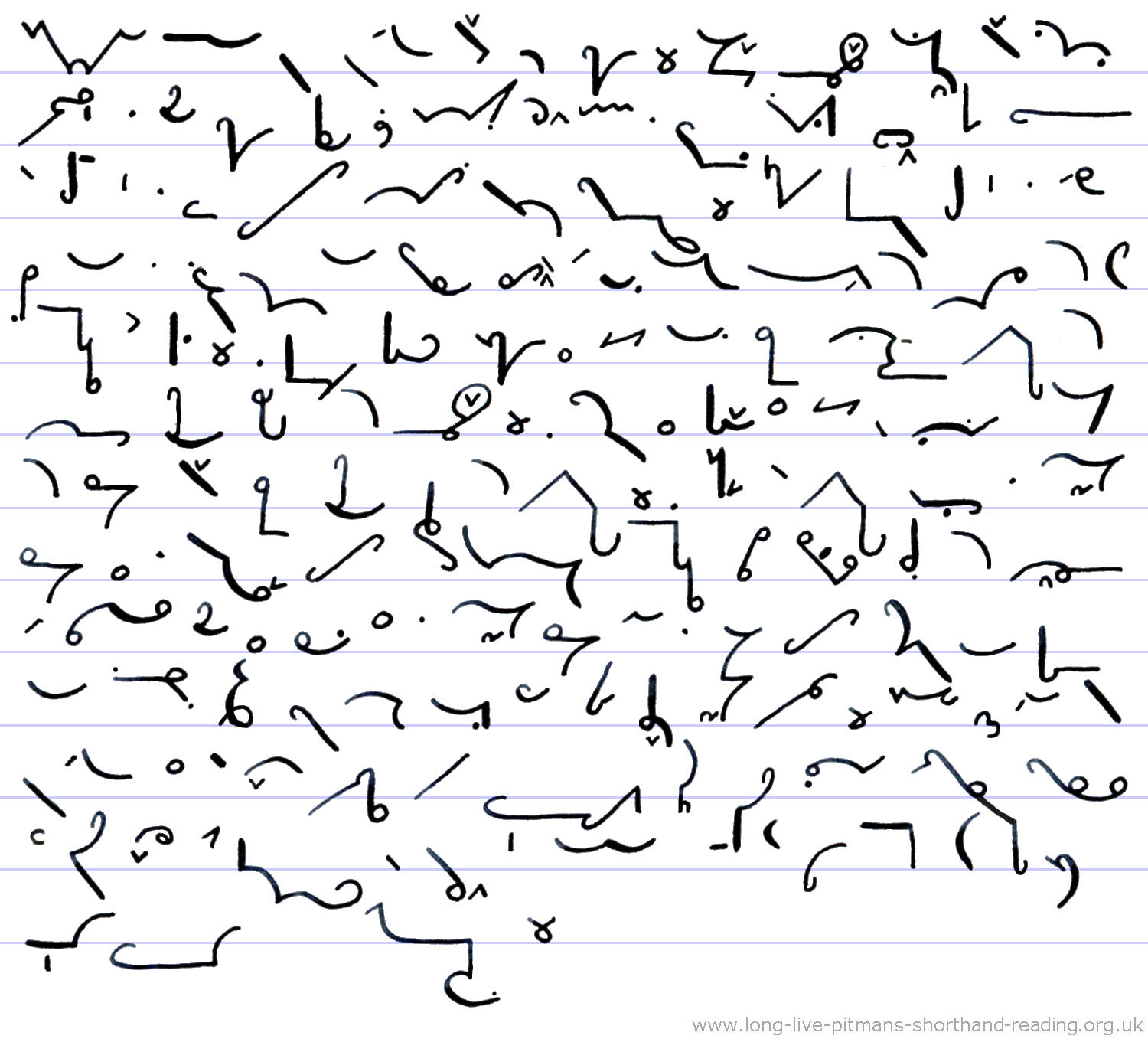
I hope you are not* going to be put off by the word "drill". Unlike the
exercises endured by army recruits, a shorthand drill does not consist
of marching around a bleak parade ground at the crack of dawn on a cold
winter morning before breakfast. On the contrary*, it can be done on a
soft seat in a comfortable room in pleasant surroundings and need never
interrupt your meals or other activities of the day. The dictionary
definition of drill is: any* strict, methodical, repetitive or
mechanical training, instruction or exercise. The verb is defined as: to
impart knowledge or skill by strict training, discipline, or repetition.
The idea of repetition to gain a manual skill is an obvious one for many
other* activities, such as sports, dancing or music, and as long as
shorthand is seen as a manual skill and not an intellectual one, there
should be no difficulty in accepting that this is the principal method
needed in order to* achieve the desired result. I knew you would not be
put off, as all my readers are quick witted, astute, shrewd, smart and
perceptive persons with sharp minds and the determination to pounce on
anything that will get them to their goal quickly and effectively.
* Omission phrases "I (h)ope you are not" "on (the) contrary" "many oth(er)"
"in ord(er to)"
* "any" The dot vowel is not part of the short form, but can be added to
help reading back
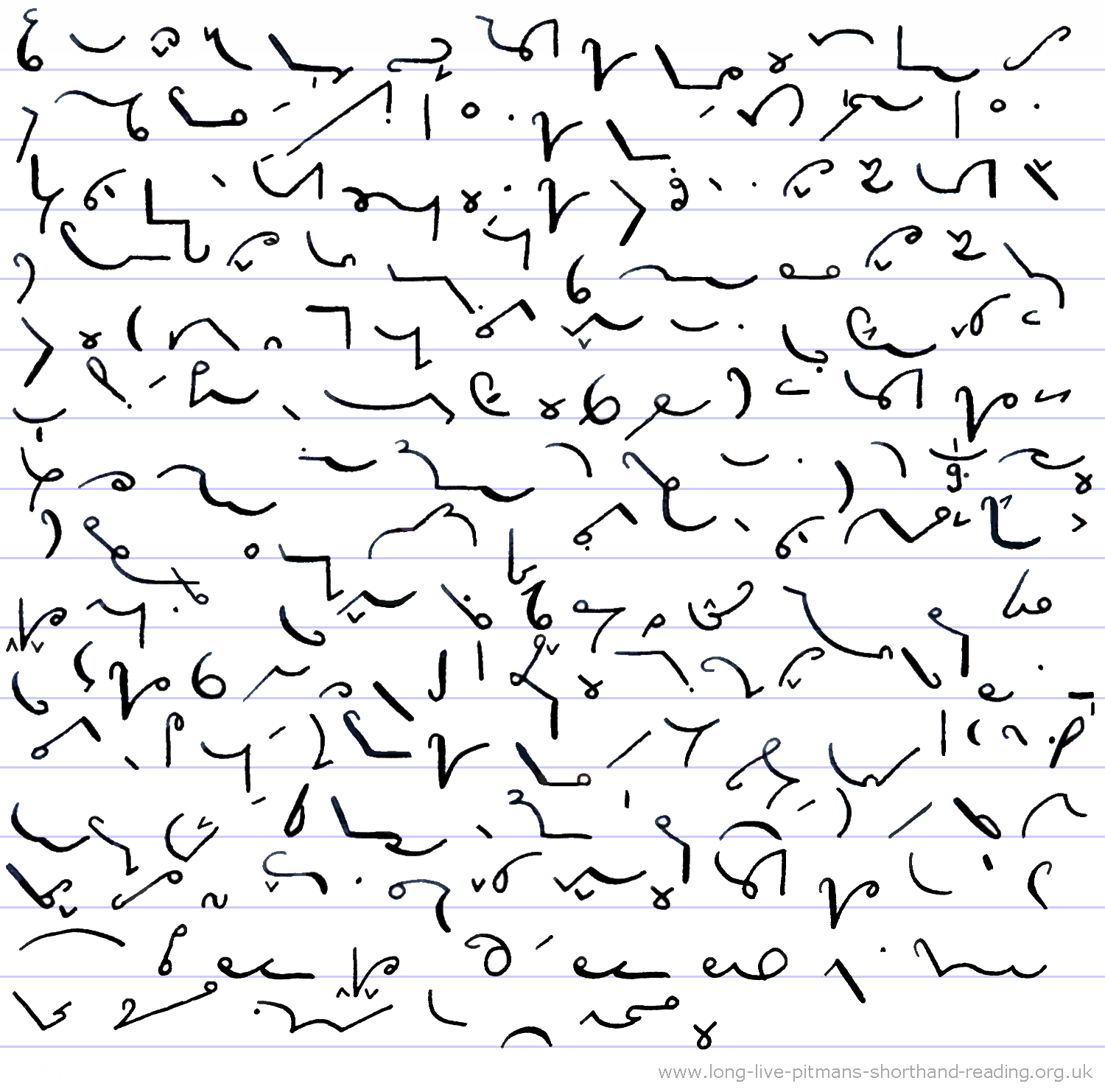
With this in mind, I have begun the creation of facility drill booklets.
I am taking one of each month's blogs and rewriting it as a drill book
and also recording it as an additional slow dictation of 40 words a
minute*. A drill page consists of a line of shorthand, followed by three
blank lines for you to copy onto, thus making six lines of shorthand per
page. They help you get into the habit* of writing in an even flowing
style with no stopping and starting to interrupt the flow. This is the
reason they are called facility drills. Facile means moving, acting,
working or proceeding in an easy or unconstrained manner. Their specific
purpose is to get the learner out of the habit* of slow laborious drawing
of the outlines and into an even writing pace, and this skill is the
foundation of future speed achievements, even though the drills
themselves are not meant to be done at high speed. Copying from the line
above is not a good habit to settle into and so the blog drill books are
only useful if you are at that particular stage, having completed the
theory and just beginning to work on speed improvement, and so are best
left behind once you have acquired a smooth style of writing. Facility
drills for all other matter, such as single outlines, phrases and single
sentences, should be a permanent part of the shorthand writer's*
armoury for improvement and increase.
* Omission phrases "words (a) minute"
"short(hand) writer's"
* "habit" Always insert the first
vowel, as this is similar to "hobby" which could also make sense
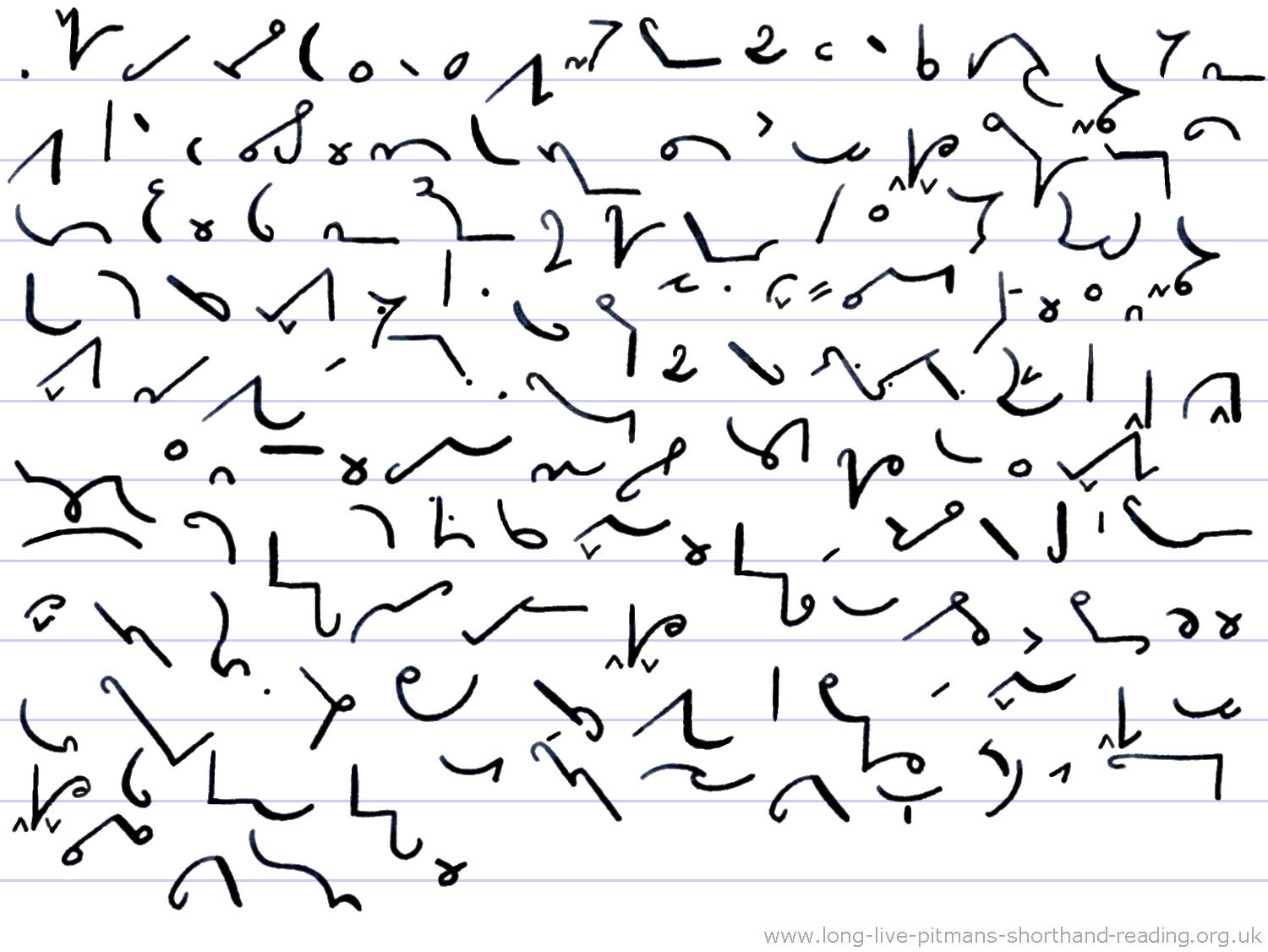
The ideal way to use them is to first read the actual blog shorthand,
with all its helpful vowels, until you can read it all without
hesitation. You may have to practise some of the new outlines separately
to get more familiar with them. Then you can work through the drill
booklet, which has only the essential vowels, doing your best to write
neatly at an even speed and with a light-handed touch. As you write, you
are reading and copying the printed shorthand above, and preferably
saying it out loud to yourself as you go. One thing* you should not use
the facility drills for is to write the matter from dictation, or
attempt fast writing. Dictations should always be done on blank lined
paper, so that you learn to recall outlines in response to the spoken
words. If you prepare a passage sufficiently* beforehand*, reading it
several times and writing out the new outlines, then taking dictation in
the proper* manner will be no hardship and the correct habits will be
formed.
* Omission phrase "wu(n) thing"
* "sufficiently" The short form includes the "-ly" version, but an L
stroke can always be added if needed, disjoined where necessary
* "beforehand" Alternative outline
* "proper" Always insert the first
vowel, and the diphone in "appropriate" as these are similar in outline
and meaning
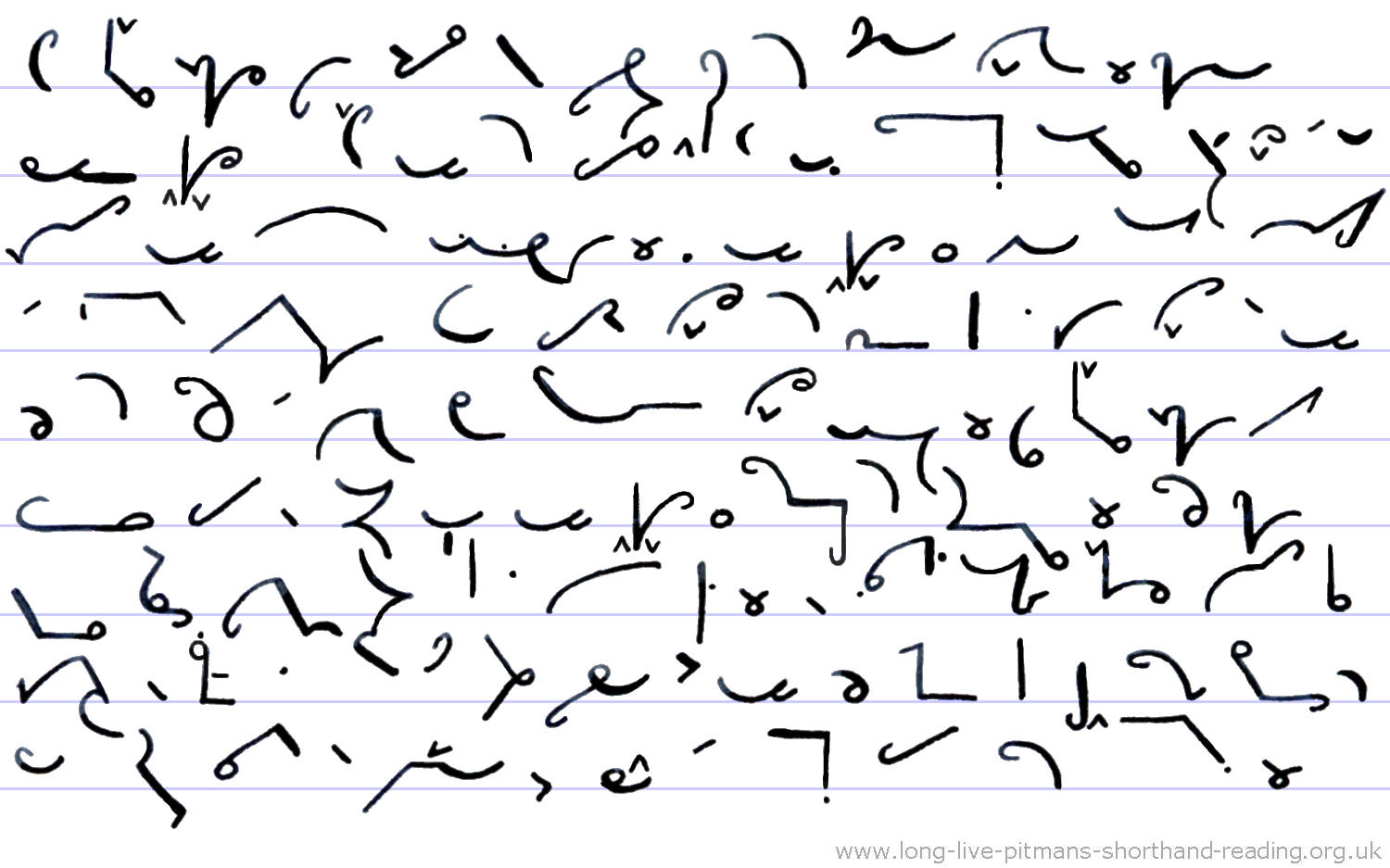
Other types of drills will always be useful throughout your shorthand
writing* life. Drilling single outlines, either new or ones that need
correcting, enables both mind and hand to learn new matter intensively.
The new outline is written in the margin and copied repeatedly along one
or two* lines, or you can do a whole line of new words or phrases and
leave several blank lines underneath. These types of drill are the
quickest way to ensure no new outline is forgotten or escapes. Phrase
drill books of this kind will be made available at a later date. To
consolidate knowledge of the items learned, it is helpful to construct a
short passage using all the new words and take it down from the spoken
word, in order to* establish the habit of reacting to the sound and
getting away from copying.
* Omission phrases "short(hand) writing" "one (or) two"
"in ord(er to)"
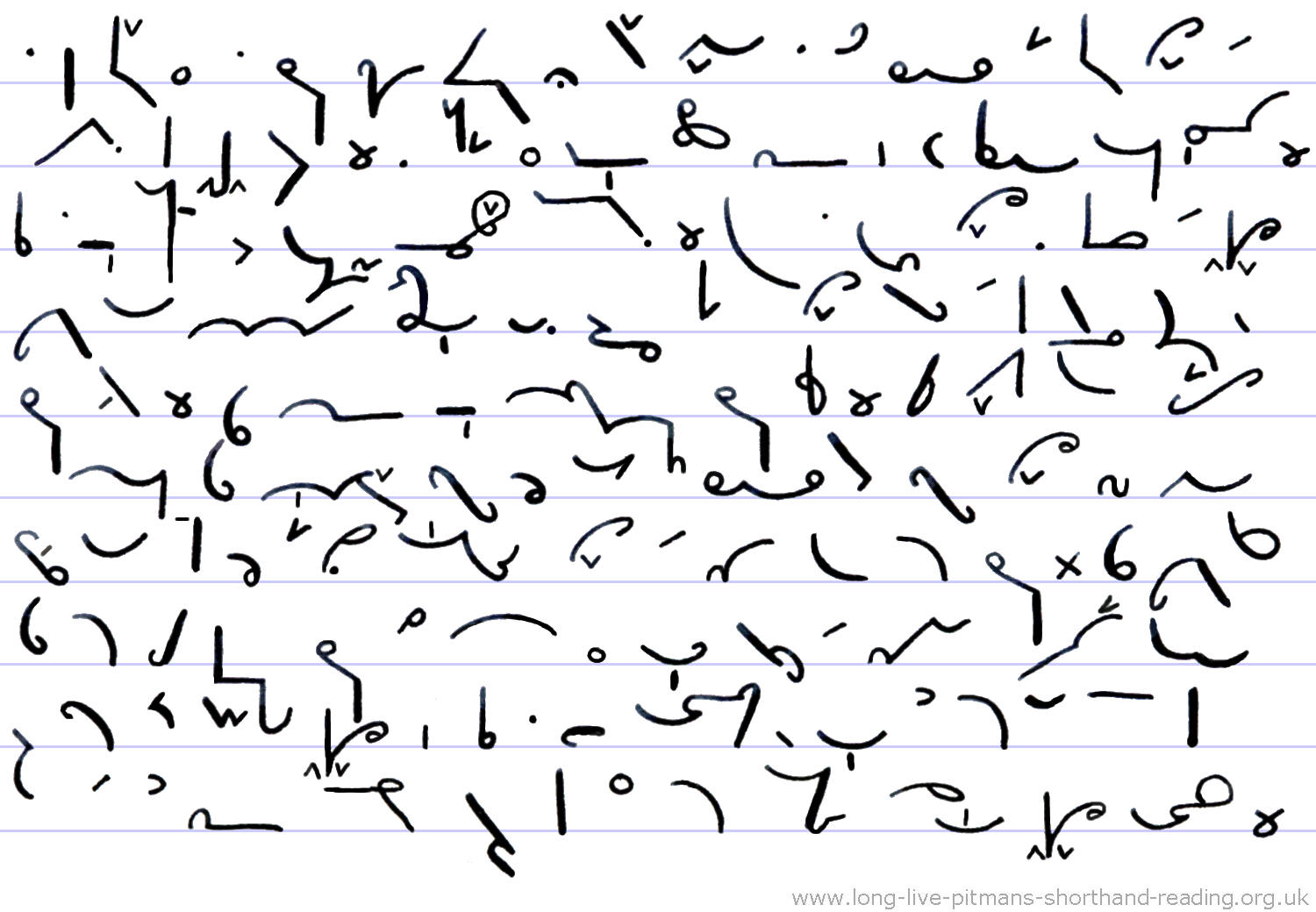
A different type is a speed drill which can be made by writing a short
sentence on the top line and repeating it down the page. The idea is to
go as fast as you can but without descending into scrawl. It is a good
antidote to the visual exercises of copying. After a few lines the text
and outlines will be in memory and there is no need to glance at the
line above and it becomes easier to speed up. These make good impromptu*
speed tests. Just write for one minute then multiply the number of words
in the sentence by the number of lines you have written, plus any odd
words on the last unfinished line, and you will have your speed. This
will be faster than your general dictation speed as the matter is known
beforehand*
and you are not really having to think very hard about the
outlines, but it is a great encourager to know what your hand can do and
what you can expect to be able to do as your knowledge of the most
common outlines increases.
* "impromptu" Omits the lightly-sounded P, so uses M and not
Imp
* "beforehand" Alternative outline
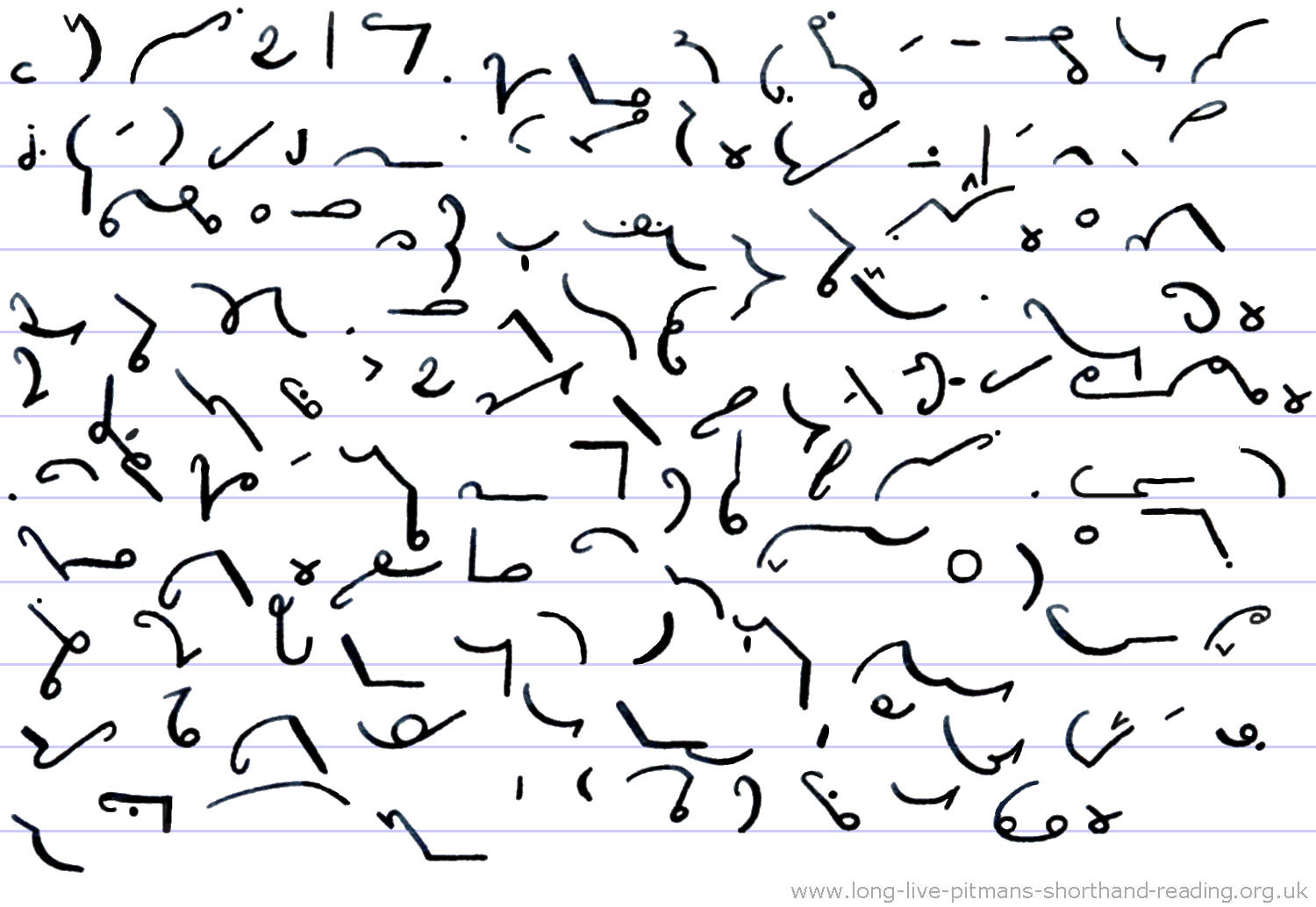
When I was learning shorthand at college the drill books were thin,
sparse and quite expensive for the little contents they had and so we
did not make a lot of use of them. They were eked out and made to last
as long as possible*, as cost meant there was no incentive to fill the
pages rapidly. As you will be printing the pages yourself, the cost
should be far less than* buying a printed version. They are the
"disposable paper plates" of the shorthand world, to be used, filled up
and thrown away as quickly as possible*. The more drills and notepads you
can get through at this stage of learning, the quicker your progress
will be. Using text more to your liking is as easy as copying passages
from the instruction book into your usual notepad, leaving the blank
lines between, and this will be necessary for the beginner who has not
finished the theory and needs to have graded matter to practise on that
matches their place in the lessons.
* Omission phrases "as long as poss(ible)" "as
quickly as poss(ible)"
* "less than" Downward L to make a good join
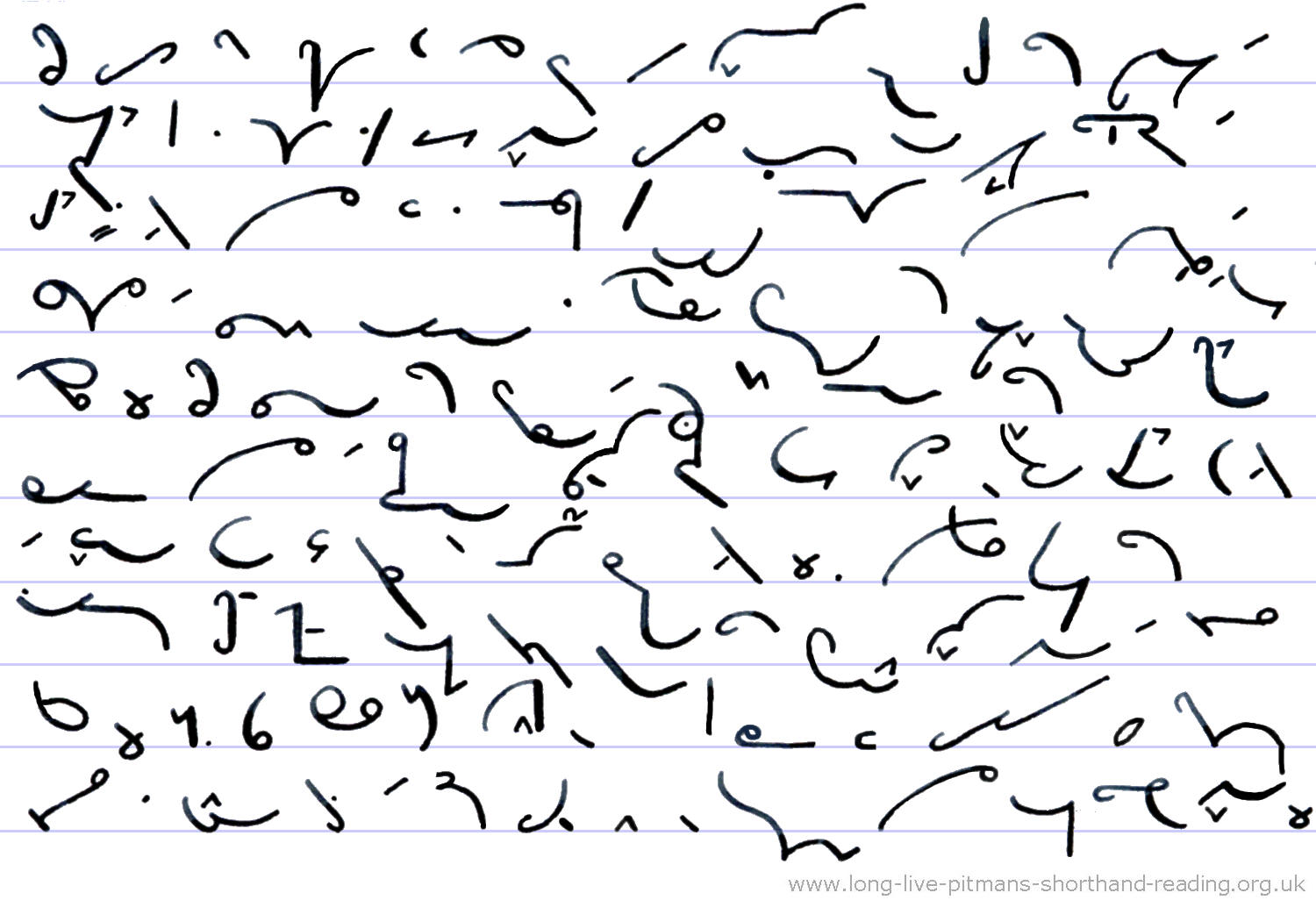
There is one particular drill that most people are likely to have done
very willingly and enjoyably at an early age, writing one's name in
real grown-up and joined-up letters, with an extra large initial capital
letter, loops and swirls, and somehow including a magnificent flourish
or underline to finish off the masterpiece*. There is something very
pleasing and irresistible about going from drawing single letters and
struggling slowly along the line, to finally joining them up and gliding
along, with the possibility* of actually speeding up. The letter forms
change from angular, drawn and dug into the paper to being* more fluent,
lightly written and of course faster. I did this as soon as I was
allowed to at school, when we were first permitted to use a fountain pen
and were shown how to form the letters into cursive writing.
* There are a few outlines that have a stroke following the loop, see
www.long-live-pitmans-shorthand.org.uk/theory-5-loops.htm#ster-loop
* "possibility" Optional
contraction
* "to being" Derivative of the
short form phrase "to be"
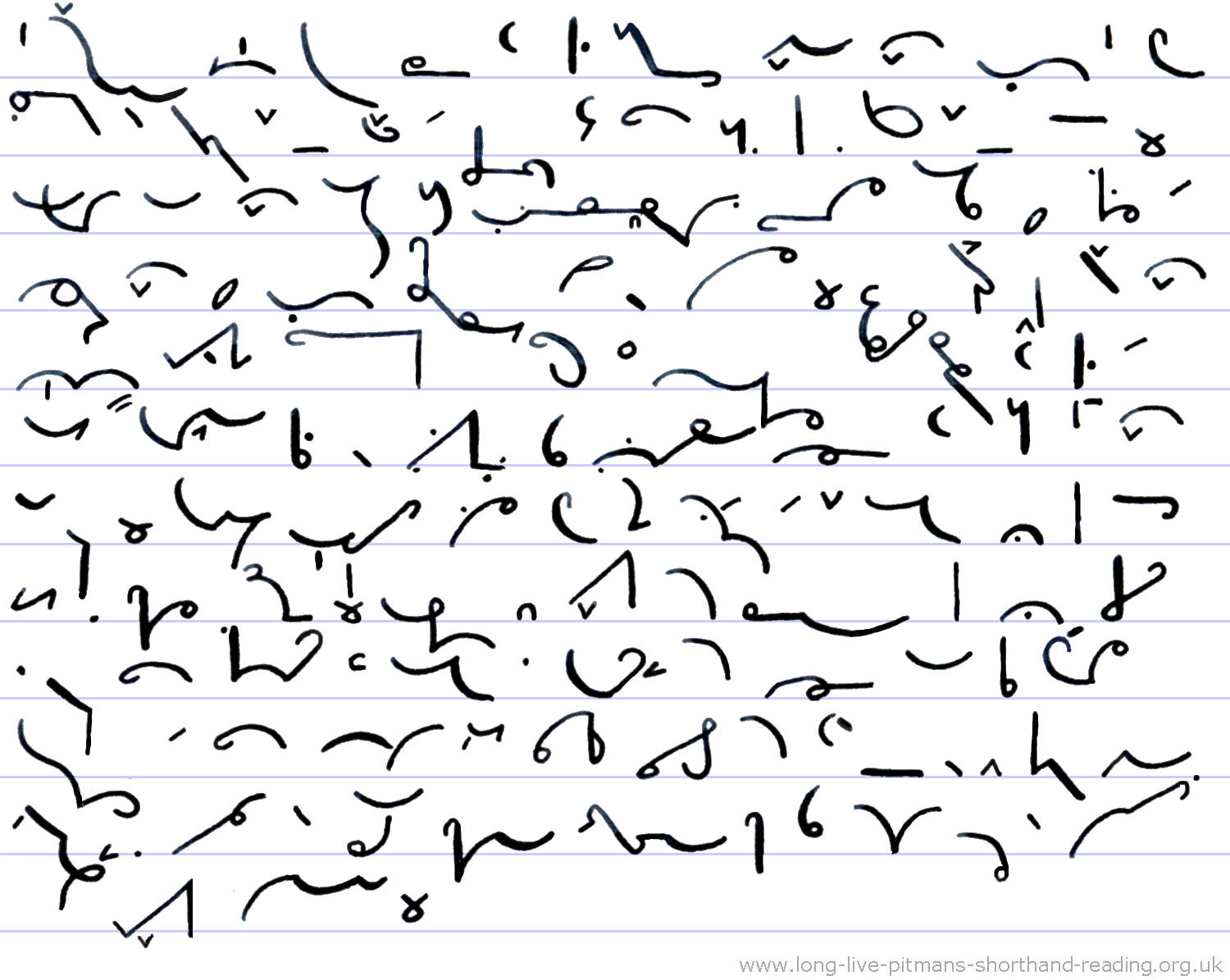
On arriving home after school that day, I began writing my name on every
scrap of paper I could find and discovered that the more I did it, the
faster I could go. Unfortunately* in my enthusiasm I was inexcusably
careless in those first attempts and misspelled* my first name,
transposing the last two letters. When this was pointed out by my Mum, I
wrote the correct version as many times as possible that day, and in the
following days, to eradicate this embarrassing mistake that I had taught
my hand to do. Fortunately no-one else ever saw the error and I never
made it again, the drills worked! Next time* you write your signature,
it may deserve a bit more admiration, with never a variation or mistake
in its flawless formation and more importantly not the slightest
hesitation or thought given to how it should be written, obviously the
result of unconscious drilling and perfecting during those early years
of learning to write longhand. (1438 words)
* "unfortunately" Optional contraction
* "misspelt" has an upward halved L
* Omission phrase "ne(k)s(t) time"
Download the Facility Drill Book PDFs at:
www.long-live-pitmans-shorthand-reading.org.uk/blog-downloads.htm
Top of page
Short Letters 3 (15 March 2015)
Each paragraph is 150 words, so writing one in 90 seconds will be
100wpm:
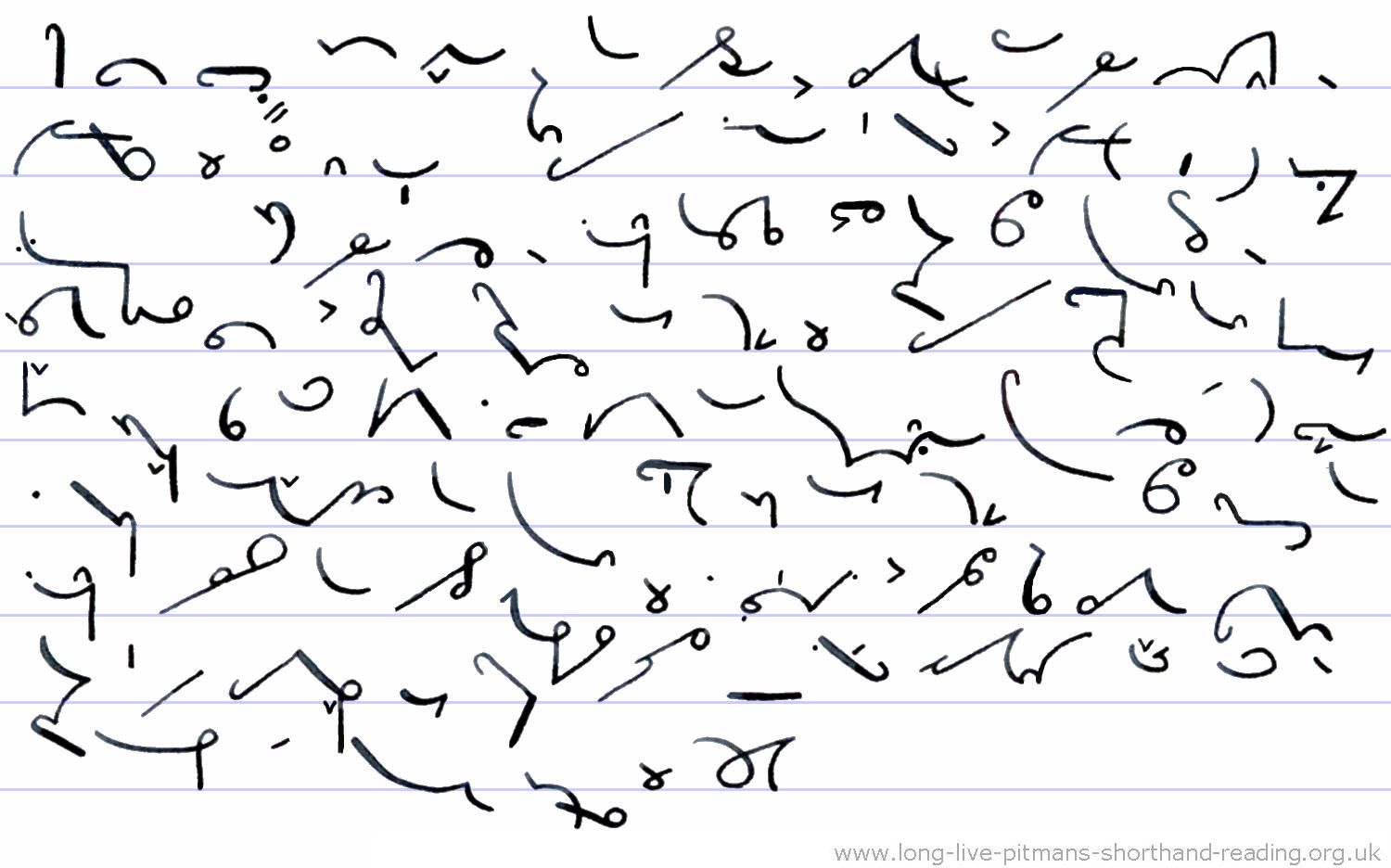
Dear Mr Green, I am writing to thank you for responding to the survey
form in our recent mailout to local businesses. As you know, we are
acting on behalf of the local authority, who wish to gauge the
effectiveness of their recent improvements to community facilities and
grants available, as well as future plans to solve some of the transport
problems in the area. We are grateful for you taking the time to provide
this information which will be a great help in formulating further
improvements and so creating a better environment for future growth of
trade in the area, as well as protection for community resources for
residents and visitors. A summary of the results of this survey will be
made available on our website under the project reference given above
and we think you will find the information of interest and benefit to
your business. Yours sincerely* (150 words)
* Omission phrase "Yours (sin)cerely"
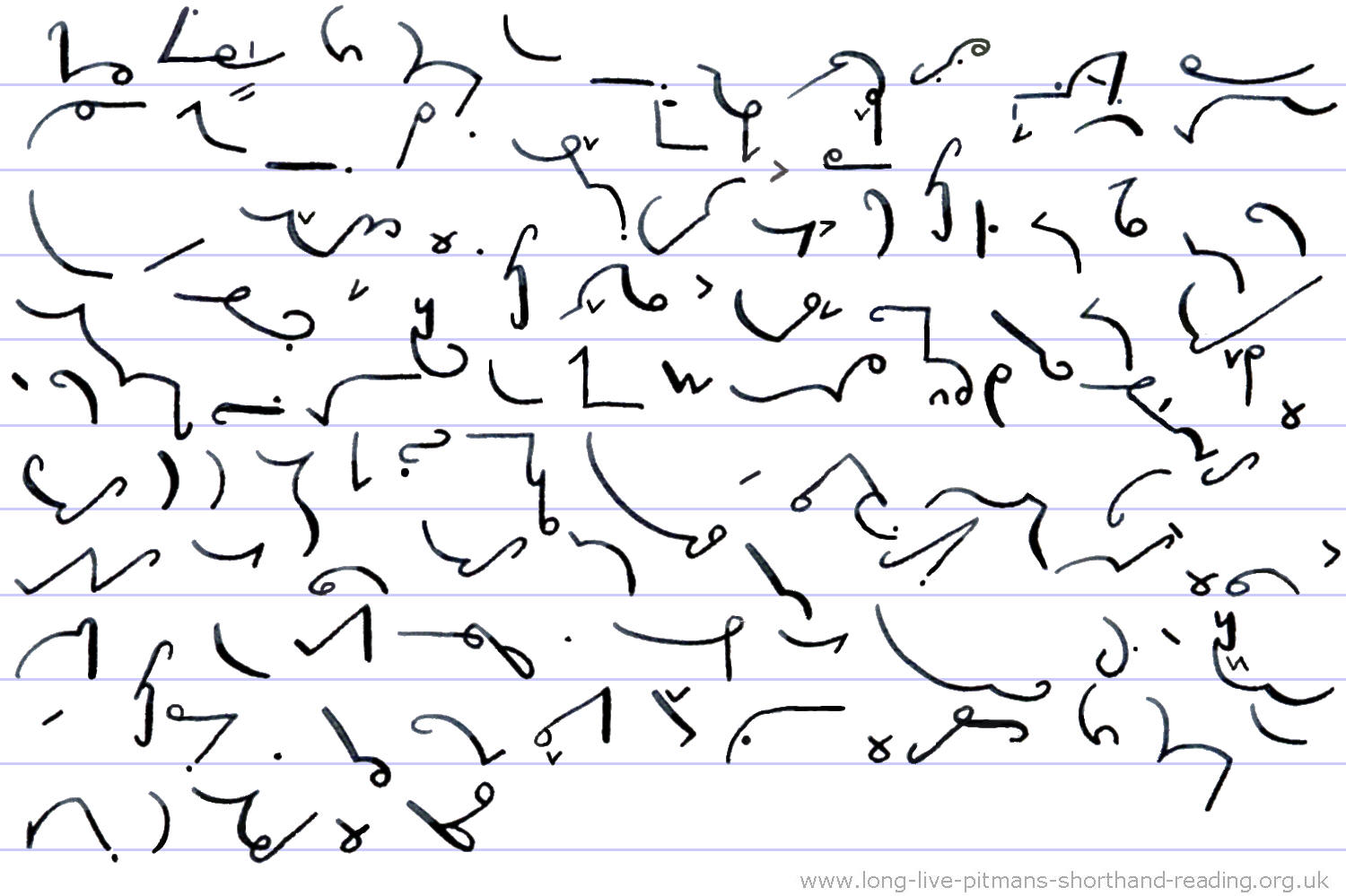
Dear Miss Jackson, Thank you so much* for coming to visit the Riverside
Wetlands Ecology Centre last week* and for giving such an inspiring talk
to the school children on the importance of looking after our
environment. The children thoroughly enjoyed their day here, and thanks
to your very informative explanation on the identification and lives of
the various creatures to be found here, they were all very eager to look
for and talk about the animals as they explored the site. Everyone was
so enthusiastic at the craft activities afterwards, and hopefully many
of them will want to return in the summer for one of your bird watching
mornings. Some of the older children have already expressed an interest
in the afternoon session of identifying and sketching the birds from the
hide by the lake. Once again*, thank you so much* for helping us in this
way. Best wishes* (150 words)
* "so much" In full, in order to join the phrase
*
Omission phrases "las(t w)eek" "wu(n)s again"
* "Best wishes" Upward Ish in order to
join this phrase
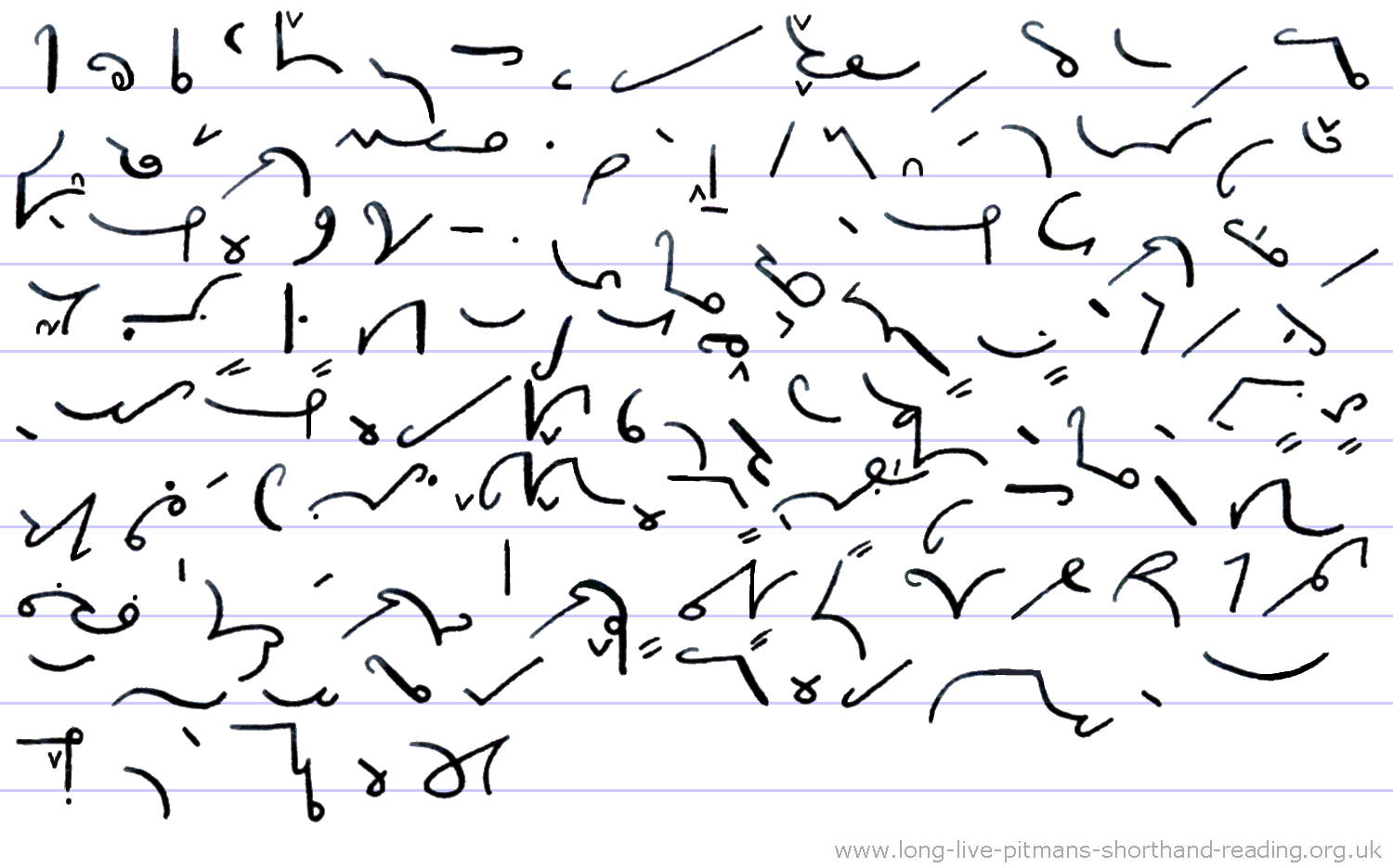
Dear Friends, It is that time of year again when we are finalising our
plans for our Club's schedule of events on the river and I enclose a
list of outings which I hope you and your family will find of interest.
As usual there are quite a few trips to places of interest along the
river, plus our annual Gala Day held in June in the grounds of the
Harbour Inn, all of which are open to anyone interested. We are
delighted this year to be able to offer for the first time* two trips to
Rocky* Island to watch the seals and other marine wildlife. Captain
Morrison will again be holding seminars on seamanship and river craft at
Riverside Hotel, which were very well* received last year and which
resulted in many new members to our Club. We look forward* to another
exciting year of activities. Yours sincerely* (150 words)
*
Omission phrases "I (h)ope" "for (the) first time" "very (w)ell"
"look fo(r)ward" "Yours (sin)cerely"
* "Rocky" Insert last vowel, as it could also be
"Rock" and context does not help
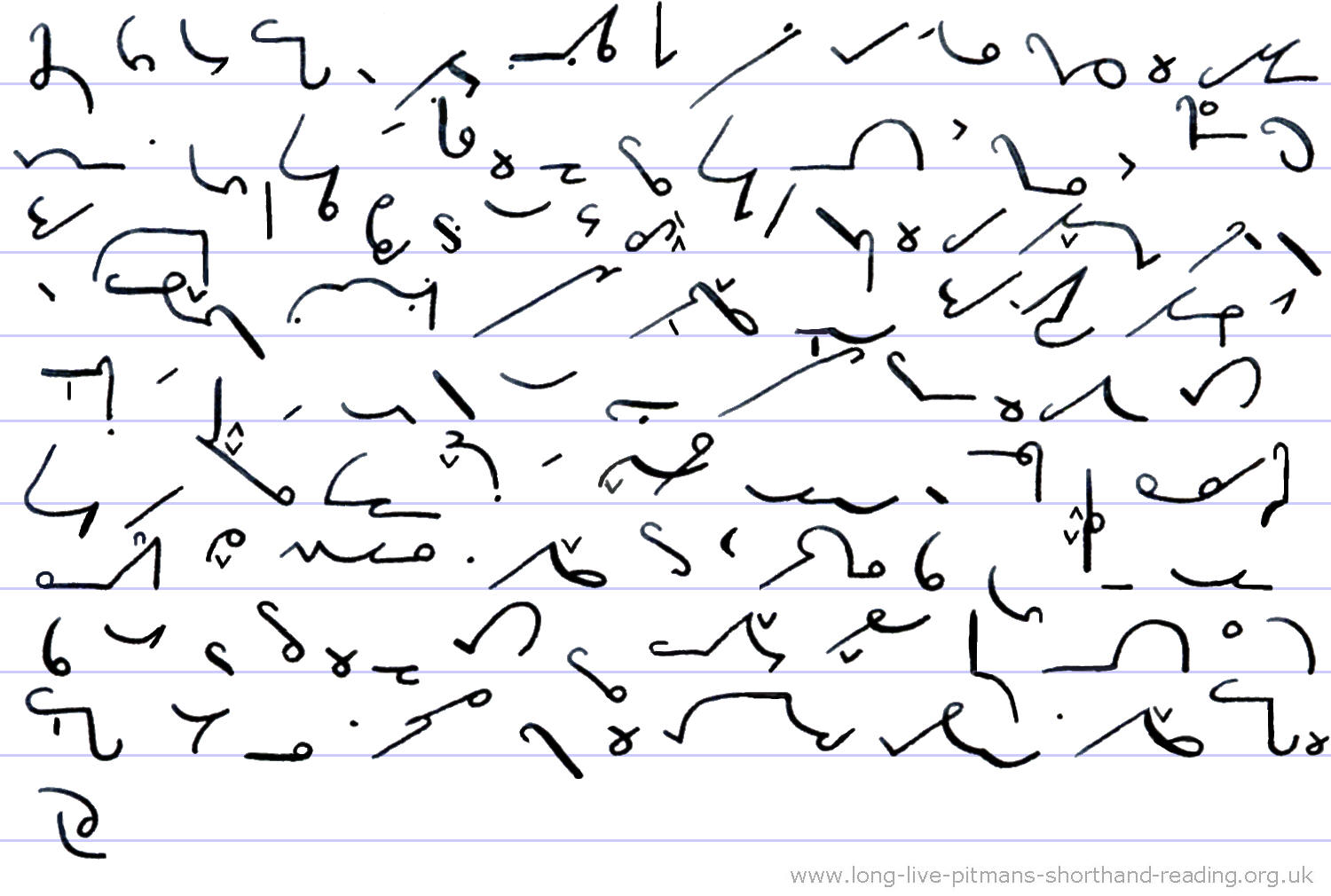
Dear Sir, Thank you for the quotation to rebuild the garages at the rear
of our office premises. We would like to make a few changes and
additions. Could you please change the colour of the bricks to the
darker version that we looked at, as this would blend in with the
surroundings much better. We require the roof to be of glass fibre
laminate rather than the rubberised coating that we originally
requested, and the guttering and downpipes should now be in grey rather
than black. We have also changed our electrical wiring and lighting
requirements, including two extra outside sensor controlled security
lights, and I enclose a revised plan that reflects this, if you could
include this in the building plans. Could you also please clarify the
rising door colour, as your quotation only gives a reference number. I
look forward*
to receiving a revised quotation. Yours faithfully (150
words)
* Omission phrase "look fo(r)ward"
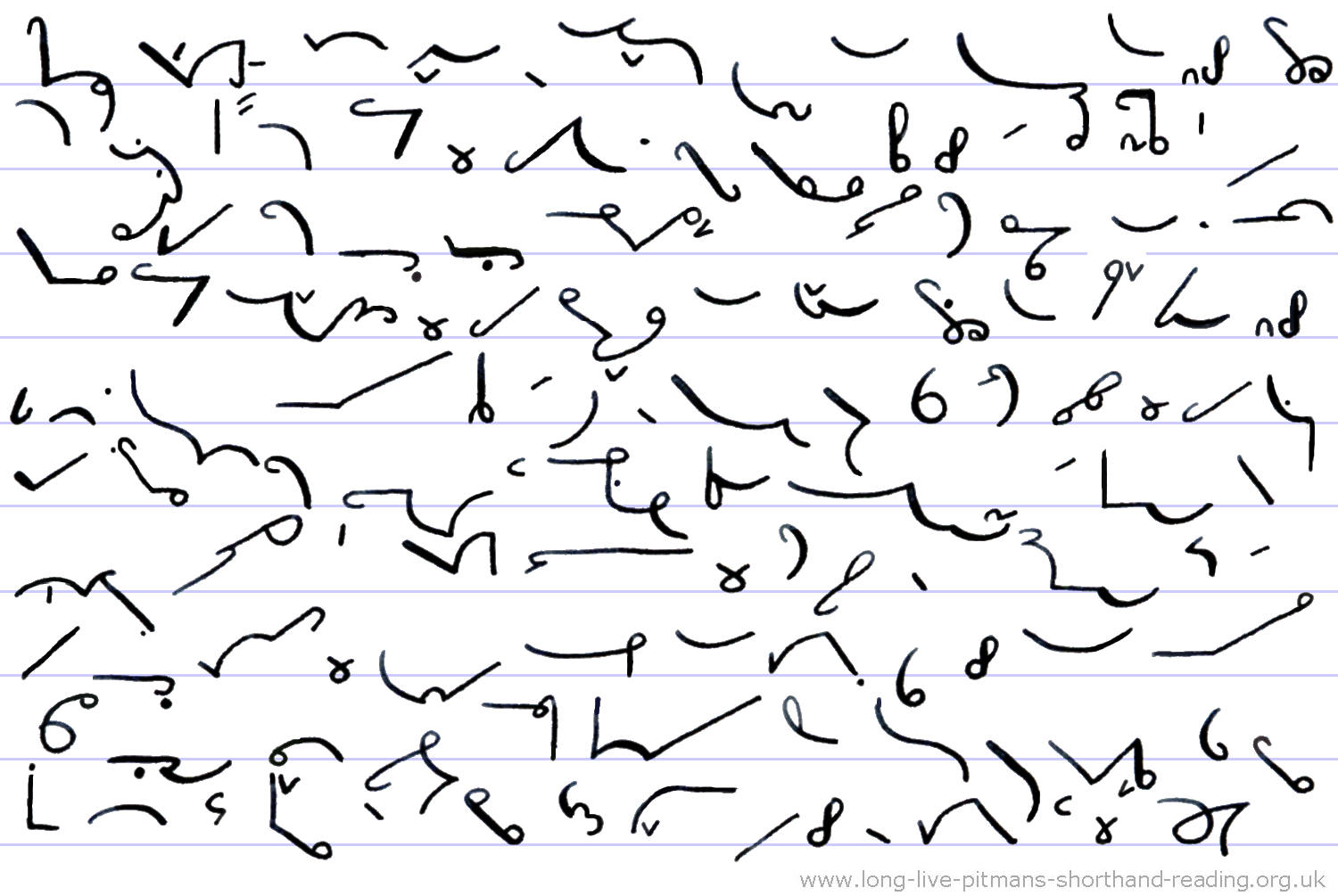
Dear Mrs Bolton, I am writing to enquire if you have any vacancies for
student placements or internships at your college. We have a number of
business studies students and graduates on our books who are very keen
to gain experience and use their skills in a commercial college
environment. We specialise in finding placements for high achieving
students who have made a firm career decision and wish to benefit both
themselves and their hosts. We vet all our applicants very carefully,
with extensive* testing, interviewing and taking up multiple references
on ability and character. They are used to working hard and are keen to
learn. If you are interested in helping these students in their careers,
as well as gaining some useful extra temporary staff for your busy
periods, then please contact me with the types of subjects that you
would like our students to help with. Yours sincerely* (150 words)
* "extensive" Keep the T clearly vertical, as it could
look like "expansive" which has a similar meaning
* Omission phrase "Yours
(sin)cerely"
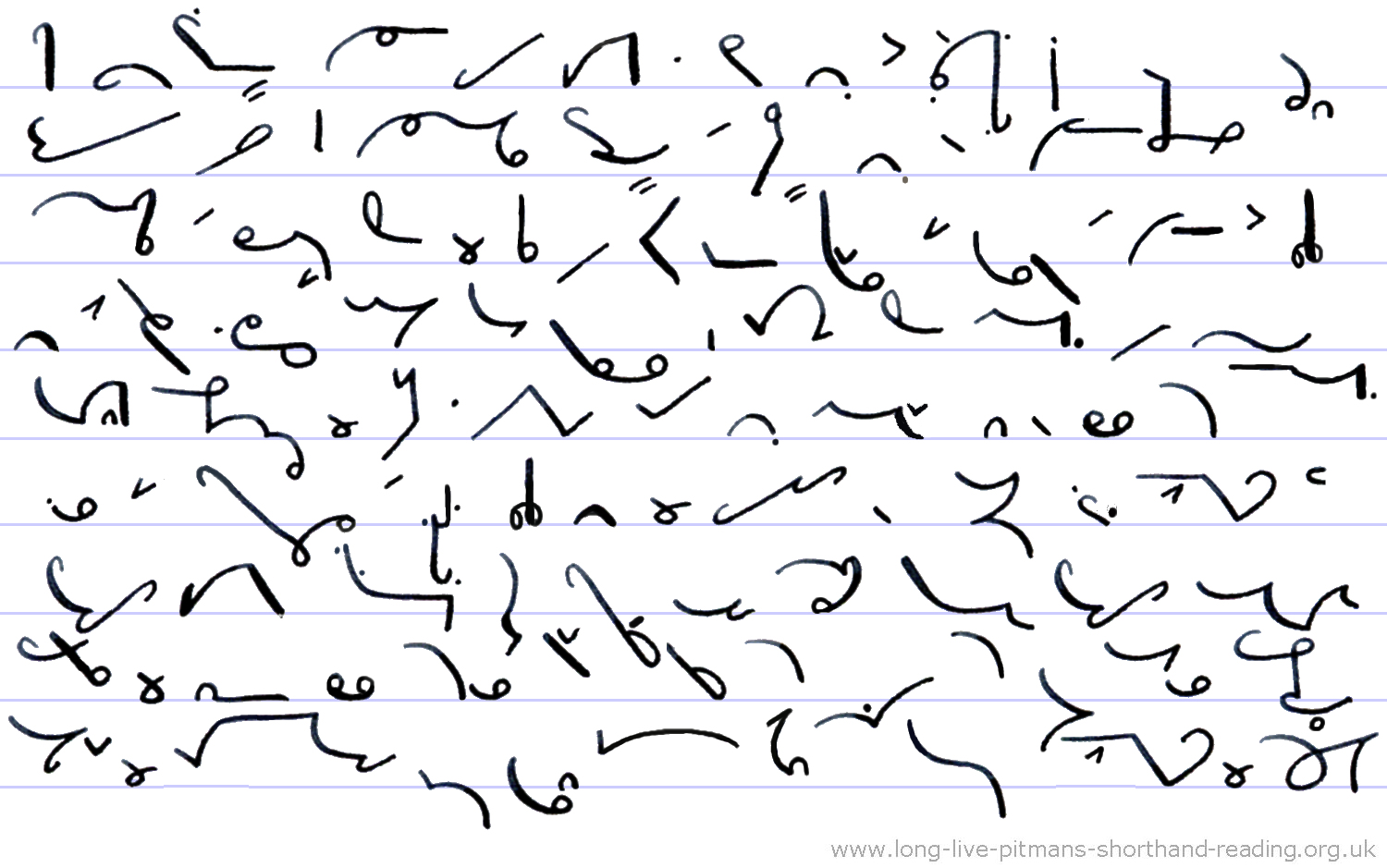
Dear Mr Black, Last week we held a special meeting of the Consultative
Committee to discuss the issues that were raised at last month's
Planning and Strategy meeting of local managers and senior staff. It is
our job to give advice on the feasibility and legality of the decisions
made, and the possible consequences not only for the business but also
the staff and indeed our many valued customers. I attach a report of our
meeting and invite you to send us your candid comments on the proposals
and tentative decisions made. We want to ensure complete cooperation
with everyone who will be affected, so that the proposed new measures
benefit everyone involved in our business. You can send us your comments
by post or email, or fill in the comments questionnaire online. I look
forward to your views on the matter* and thank you for your cooperation.
Yours sincerely* (150 words) (Total 900 words)
* Omission phrases "on (the) matter"
"Yours (sin)cerely"
Top of page
Solar Eclipse (20 March 2015)
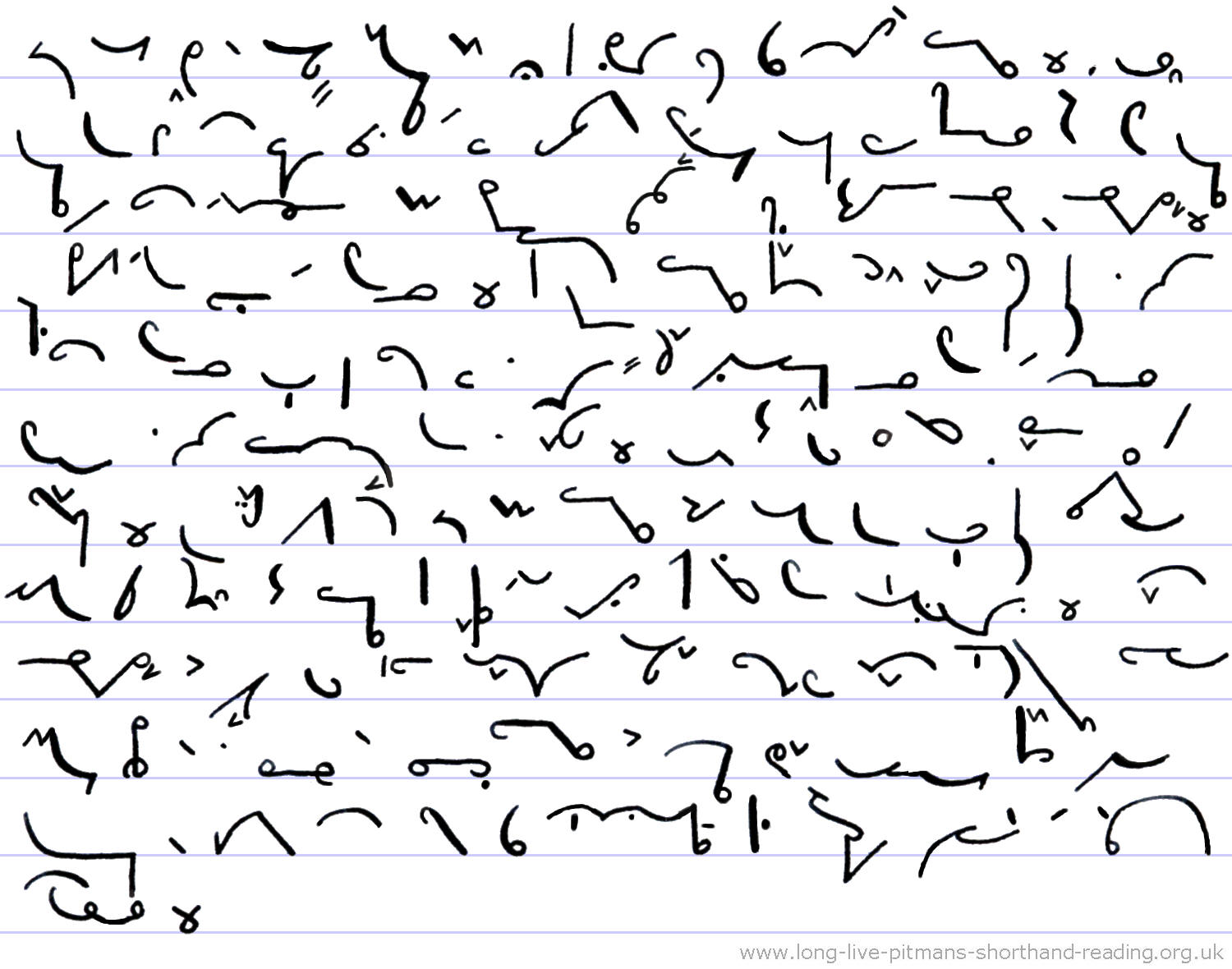
Here in the South of England I have just about made it safely through
this morning's eclipse. The news feeds have told me when it will "hit"
and when we will be "plunged" into near darkness, although other feeds
are more optimistic about the "spectacular celestial* treat" that we can
expect to experience. Today started off grey and overcast. At peak
eclipse time, around 9.30, it was a little more overcast, no different
from when a middle-sized rain cloud comes over and makes everything a
little gloomier for a while. Now that the event has passed, the sky is
much brighter. If I had not* read or heard about the eclipse, I would
never have known it was happening and would have just assumed that the
clouds had decided not to rain and had passed over uneventfully. My
experience of the real event occurred entirely online, from the comfort
of my cosy computer corner, and I have the satisfaction of a succession
of screen grabs of the images supplied, including the diamond ring
effect, to help me remember this momentous day of planetary, lunar and
solar magnificence.
* "celes(t)ial" Omits the T
* "I had not" Needs the dots, as this is the same outline as "I do not"
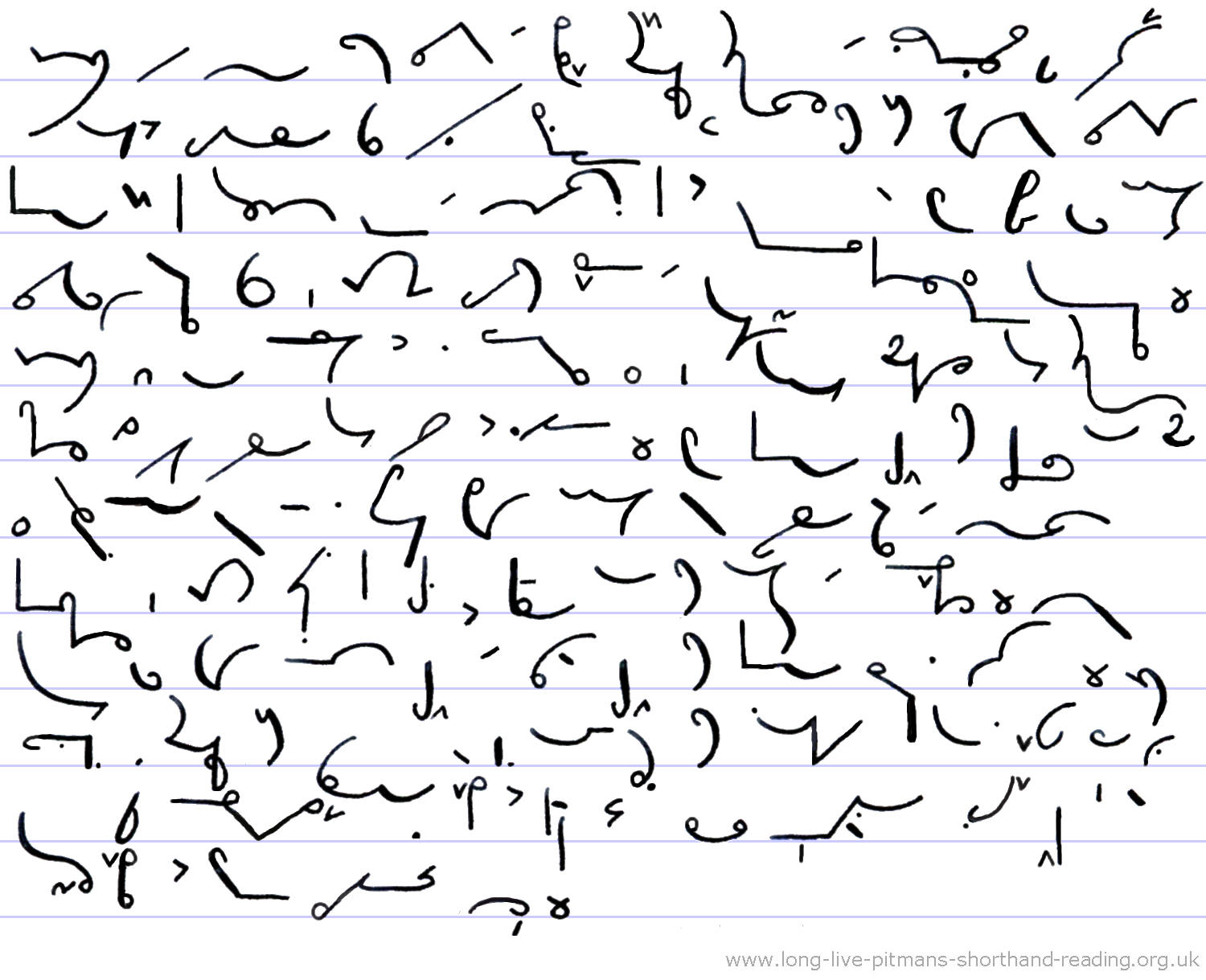
I am sure there* are many very happy and satisfied scientists,
astronomers and stargazers who have really enjoyed witnessing this rare
spectacle with their own eyes, and they will be happily talking about it
for some time* to come, and marvelling at all the pictures of every stage
of the event, not only the heavenly bodies themselves but also the
weather, sky and visual atmospheric effects. I am sure you know exactly
what an eclipse is but having the shorthand outlines for the astronomy
terms is the real reason for the rest of the article. However, taking
down their discussions in shorthand is possibly going to be quite a
challenge, as they will not only be using all these and many more
technical terms*, but also chattering at ten to the dozen in their
enthusiasm and excitement. Maybe after the event they will calm down and
slow down their talking speed a little. To their credit, the scientists
I was listening to did in fact* cease their commentary for a while, in
order to* let viewers just experience the sight of the totality, with the
sun's* corona shining out on all sides of the black circle of the moon.
* "for some time" Halving for the T of
"time"
* "I am sure there" Doubling for "there"
* Omission phrases "tech(nical) terms" "in ord(er to)"
"in (f)act"
* "sun's" Normally it is advisable to insert vowels to distinguish
between sun/snow and sunny/snowy but the context here makes that
unnecessary
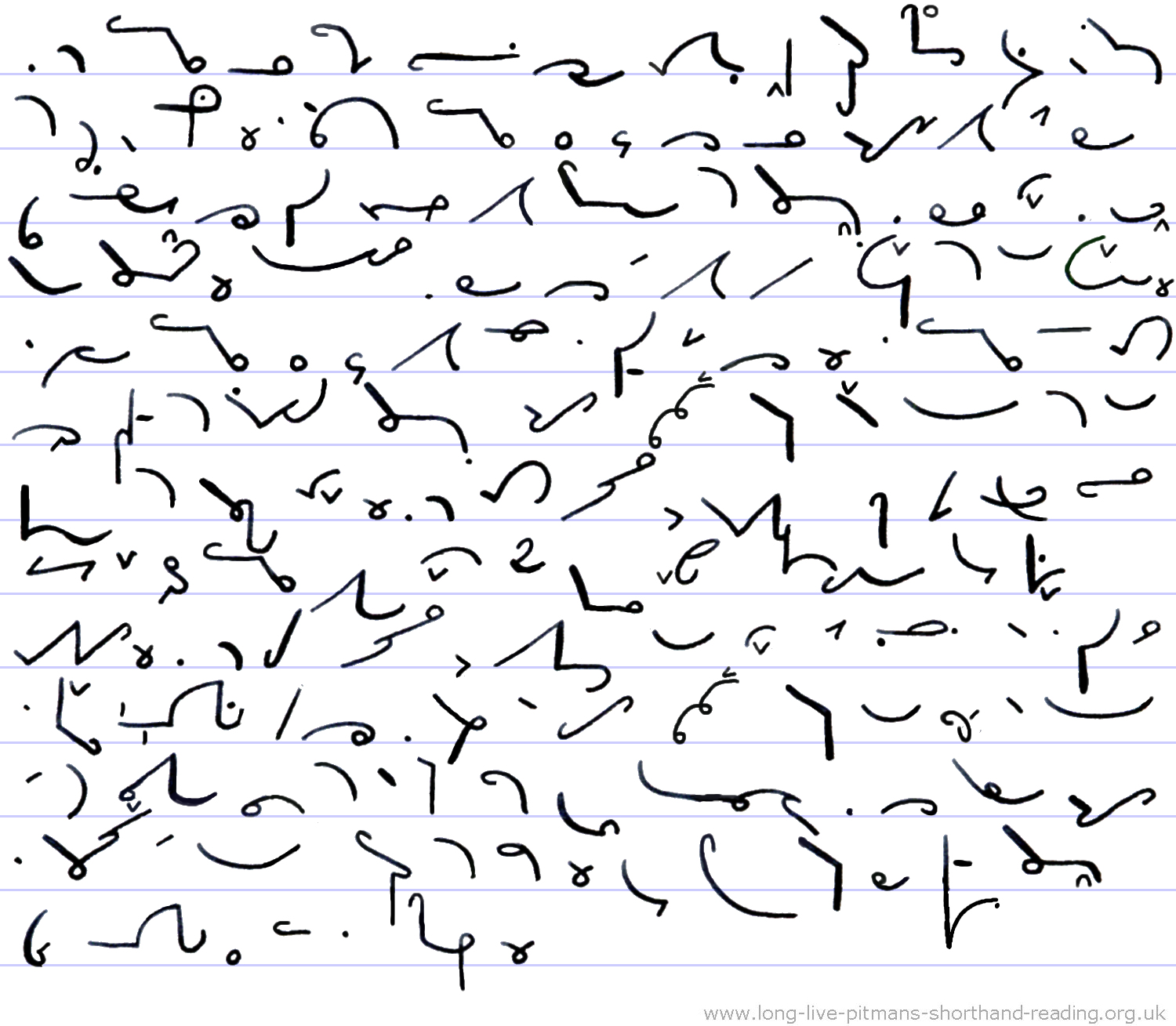
The word eclipse comes from the Greek meaning to leave out, abandon,
darken, fail to appear or cease to exist. A solar eclipse is when the
moon comes between the earth and the sun, thus causing the moon's shadow
to cross the earth, blocking or obscuring the sun's light, the noun
being obscuration. In other words*, the sun, moon and earth are aligned*,
or in alignment*. A lunar eclipse is when the earth casts a shadow on
the moon. An eclipse can also mean the total or partial obscuring of one
celestial body by another, or any dimming or obstruction of light. The
word also refers to the period of time during which the phenomenon*
occurs: I spent the eclipse reading my shorthand books, whilst waiting
for the daylight to return. The word generally refers to the reduction
in light and the casting of a shadow and is a type of occultation, which
means the passage of one celestial body in front of another, and so
hiding some or all of it from view, for example, the moon passing
between an observer and another planet or star. If the further body is
not totally obscured, then the occultation is called a transit.
* "in other words" Doubling to represent
"other"
* "align, aligned, alignment" Downward L in order to indicate a preceding vowel,
therefore cannot take an N hook
* "phenomenon" Optional
contraction, plural "phenomena" is the same but omitting the N hook
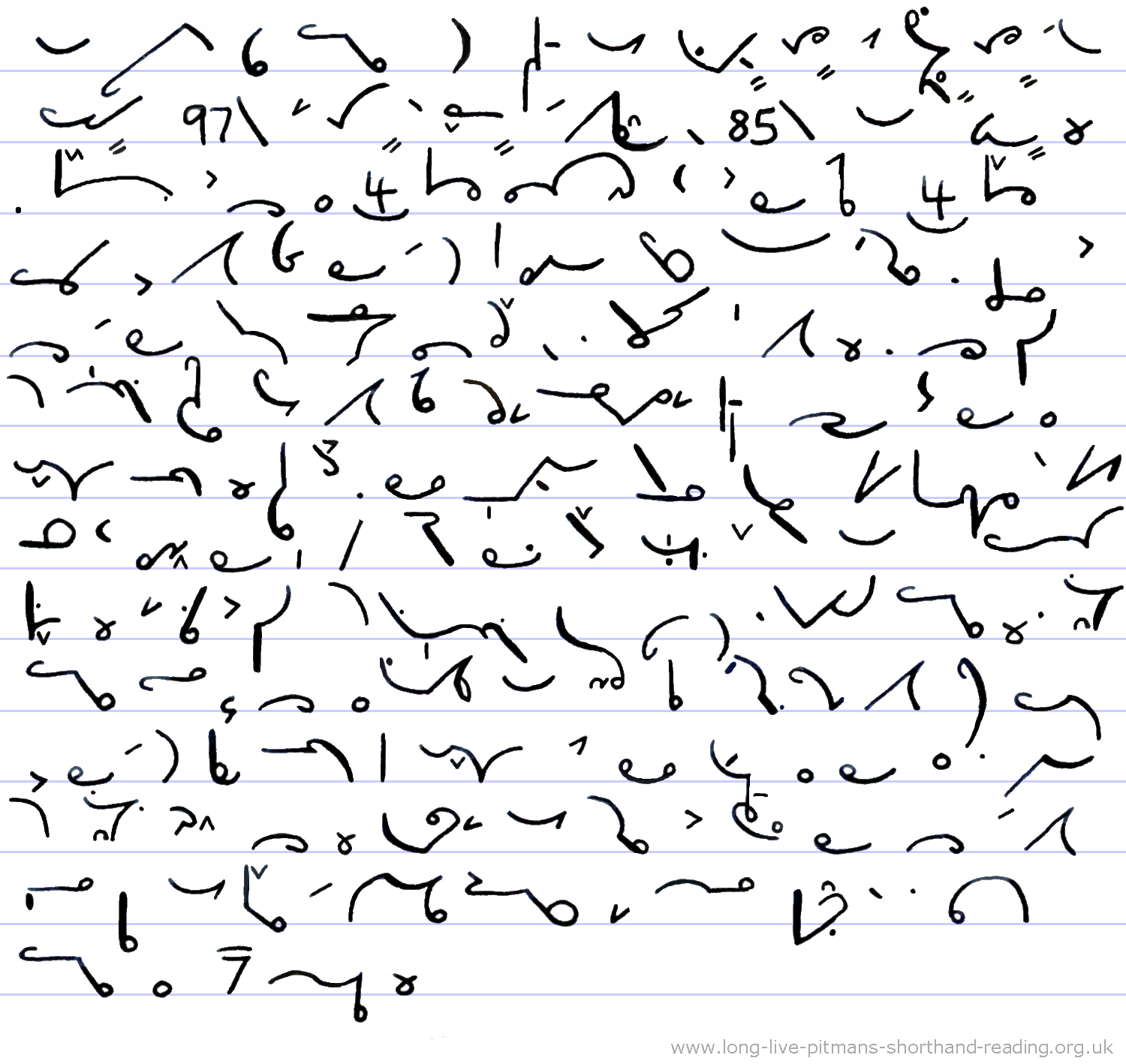
In Europe, this eclipse was total in the Faroe Islands and the Svalbard
Islands off Norway, 97 percent on the Isle of Skye, and reducing to 85%
in London. The diameter of the moon is 400 times smaller than that of
the sun, and it is 400 times closer to earth than the sun, and so at certain places in their orbits,
the disks of the moon and sun appear exactly the same size to an
observer on earth. The moon's shadow or umbra travels over the earth,
and those areas experience totality, meaning that the sun is entirely
covered. At this point, the sun's corona becomes visible, which are
tendrils of charged gases that surround the sun but which cannot be seen
by the unaided eye in normal daylight. On the edges of the shadow or
penumbra, viewers will see a partial eclipse. An annular eclipse occurs
when the moon is farthest in its orbit from the earth, therefore nearer
to the sun, and so does not cover it entirely, and the sun's photosphere
is seen as a ring or annula around the moon. Variations in the orbits of
the sun, moon and earth cause differences in the types and lengths of
eclipses, but the maximum duration of a solar eclipse is seven and a
half* minutes.
* "seven and a half" For more ways to write fractions see
www.long-live-pitmans-shorthand.org.uk/vocabulary-numbers.htm#fractions
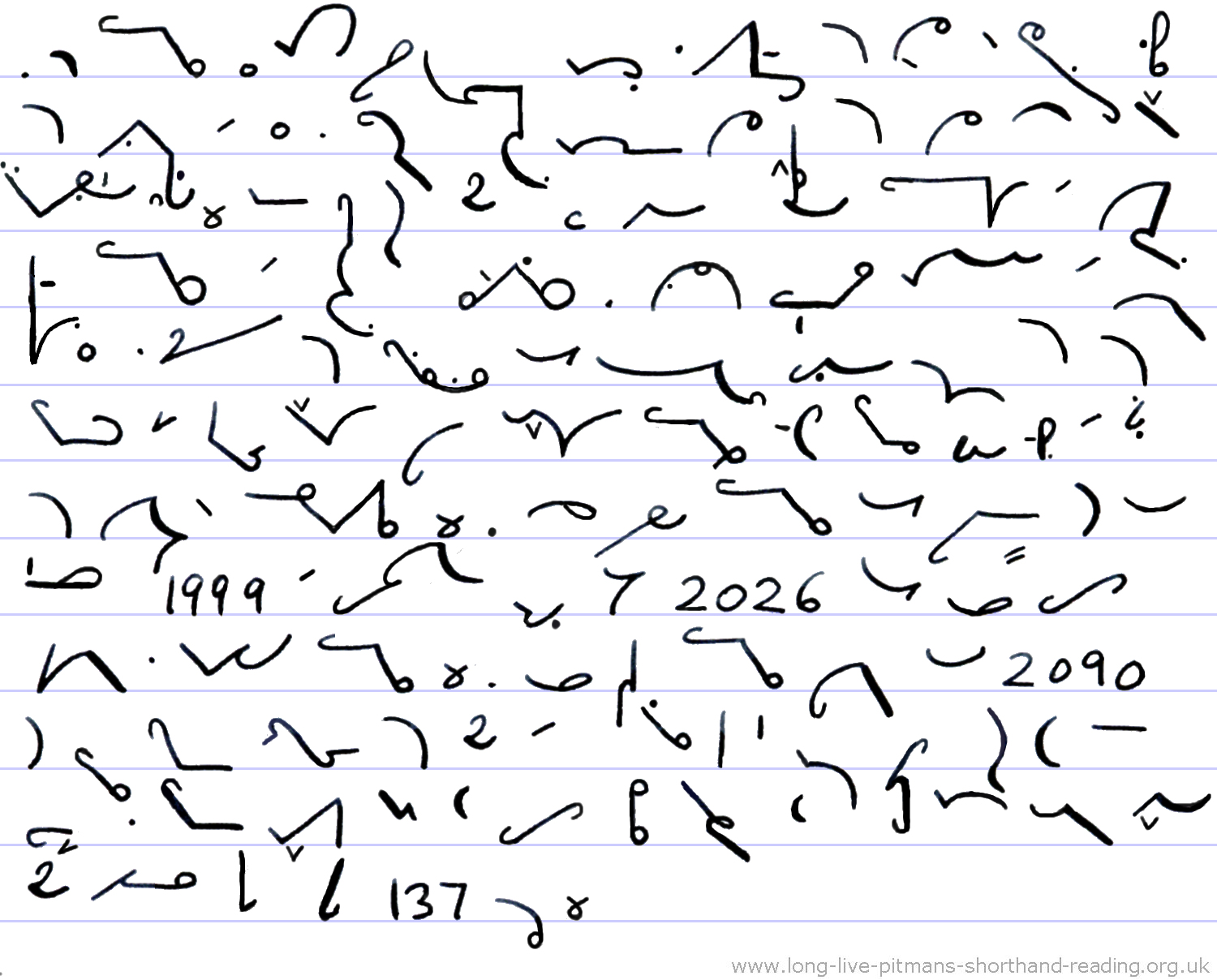
The word eclipse is also used figuratively to mean a reduction or loss
of splendour, status or reputation and, as a verb, to make less
outstanding or less important by comparison. I can truthfully say that
shorthand, when written correctly and legibly, totally eclipses and
surpasses the lesser glories of longhand, and maybe as a shorthand
writer*, your presence in the interview waiting room, or your
application on the top of the pile, will entirely eclipse the other
applicants who have not studied and achieved your level of expertise.
The most recent eclipse in the UK was in August 1999, and we will have
to wait until 2026 for the next one, which will be a partial eclipse.
The next total eclipse will be in 2090, so please practise and perfect
your shorthand and pass it on to your children so that they can create a
blog to write about that one, as it is possible that I may not be
writing shorthand articles at the age of 137 years. (976 words)
* Omission phrase "short(hand) writer"
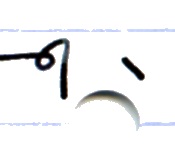
An eclipse is what you get
when you scan paper
that has a punched hole
Top of page
Proverbs Reclaimed (29 March
2015)
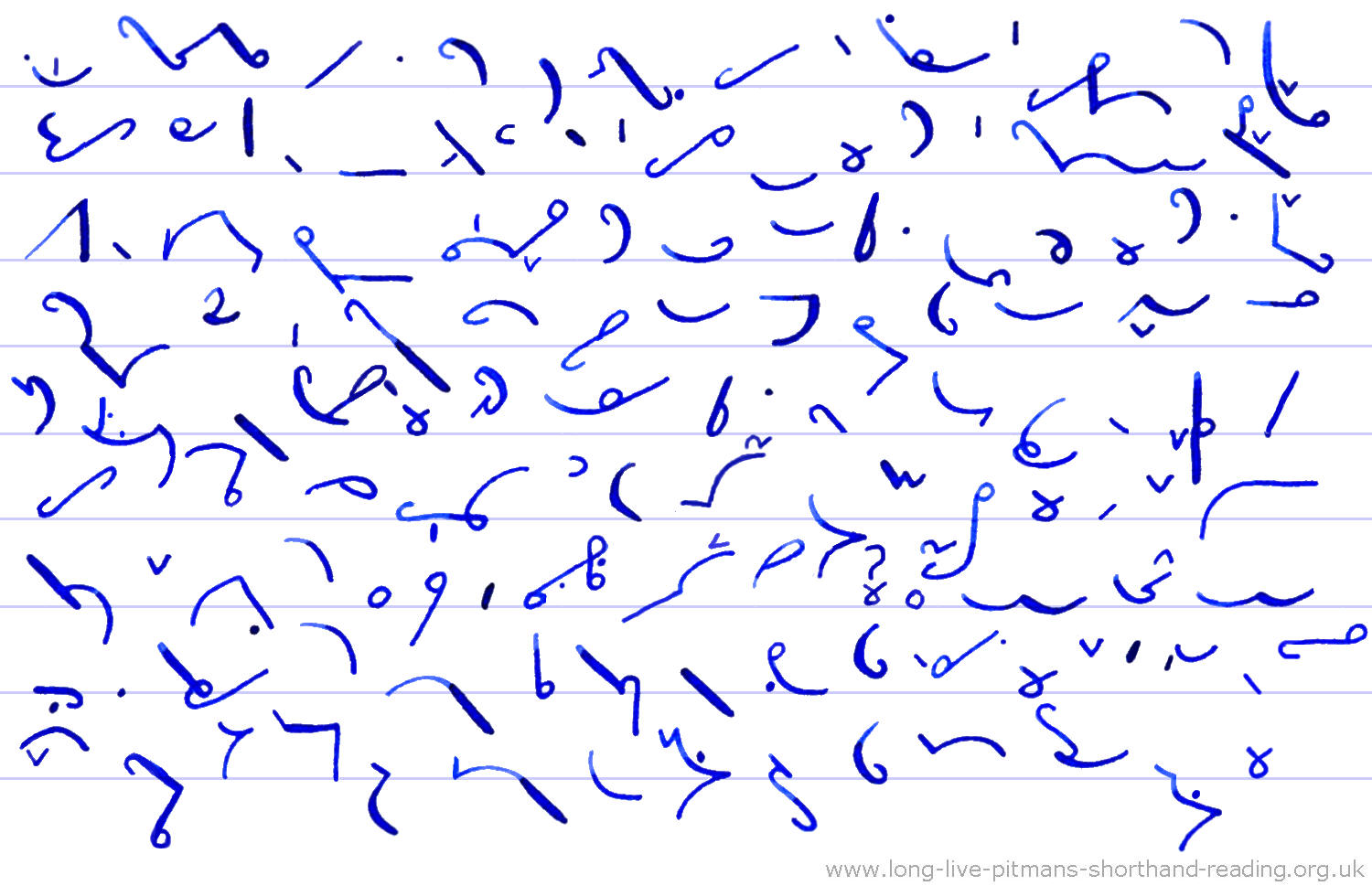
Common proverbs are a very easy and brief way of passing on wisdom or
advice that one has not had to come up with all on one’s own. They are
on permanent* standby, ready to help the speaker summarise their opinion
in just a few words. They are a type of verbal shorthand, but probably
more used in casual speech than in writing, because of their tendency to
be overused. They are not the answer, just an opportunity for the
listener to decide which one matches most closely what they actually
feel about the situation. Should I look before I leap, or is he who
hesitates really lost? Is nothing ventured nothing gained the best way
or maybe it is better to be safe than sorry. I ought not to cross my
bridges until I get to them, but maybe if I fail to plan, I am planning
to fail.
* "permanent" See
www.long-live-pitmans-shorthand.org.uk/distinguishing-outlines-2-rule.htm
"prominent permanent pre-eminent"
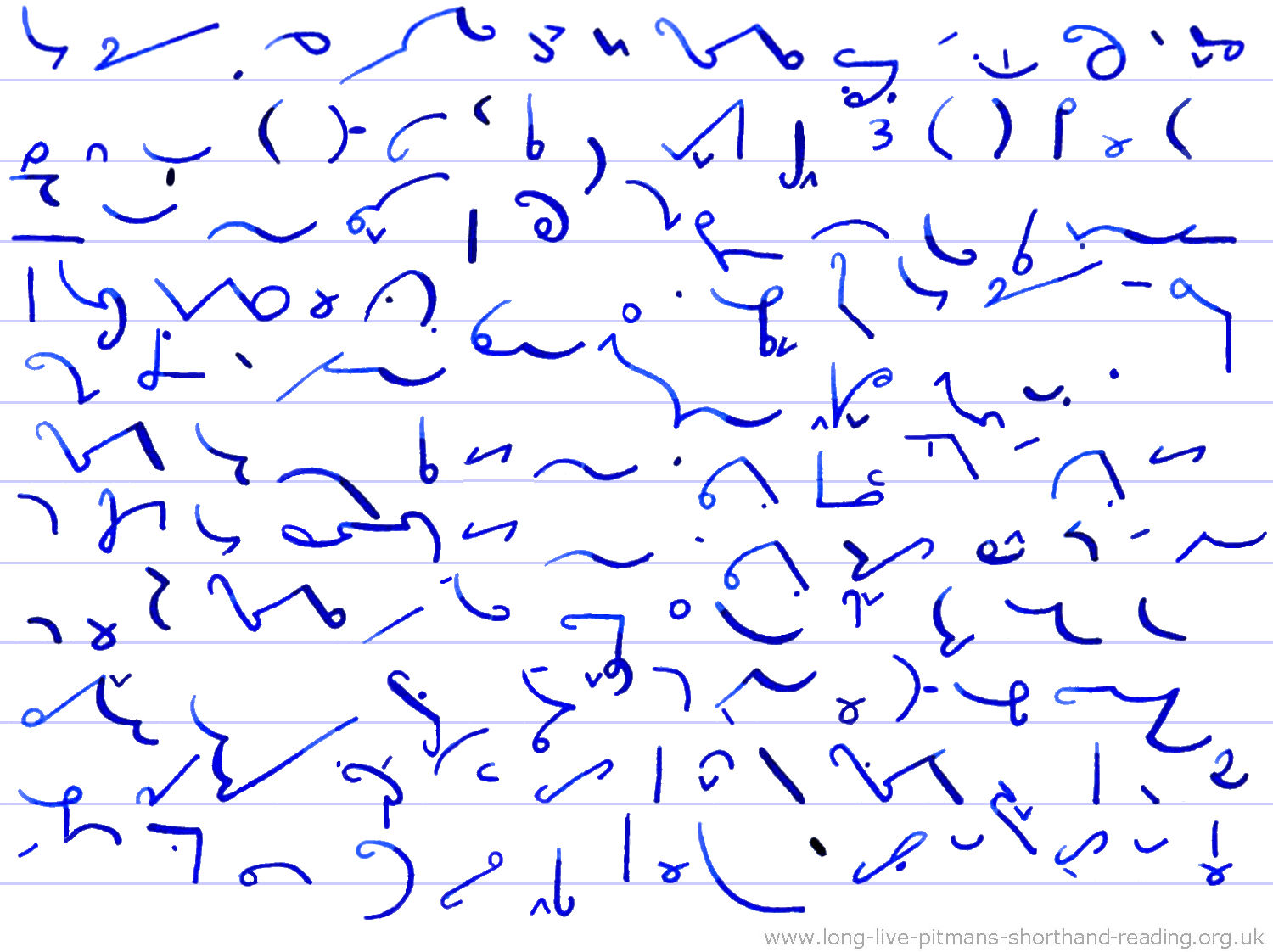
For the shorthand writer*, the most relevant point about proverbs,
clichés and common phrases of all kinds is the fact that* you know them
so well, that it is easy to write down what you think was said. They
come in many slightly different versions, or the speaker may even choose
to mangle it for their own purposes. Lazy listening is an insidious trap
for the shorthand writer*, quite separate from the task of recalling and
forming outlines, and if you need a proverb for that, maybe it is "Many
a slip ‘twixt cup and lip" or, translated* for the stenographer,
"Many a
slip between sound heard and written word". Although proverbs are often
criticised as being trite, they would never have survived if they were
blatantly false or wrong. So, instead of cringing next time* you are
confronted with one, it might be preferable to apply it to shorthand and
get some fresh use out of it. After all, waste not, want not!
* Omission phrases "short(hand) writer" "is the (f)act that" "ne(k)s(t)
time"
* "tra(n)slated" Omits the N
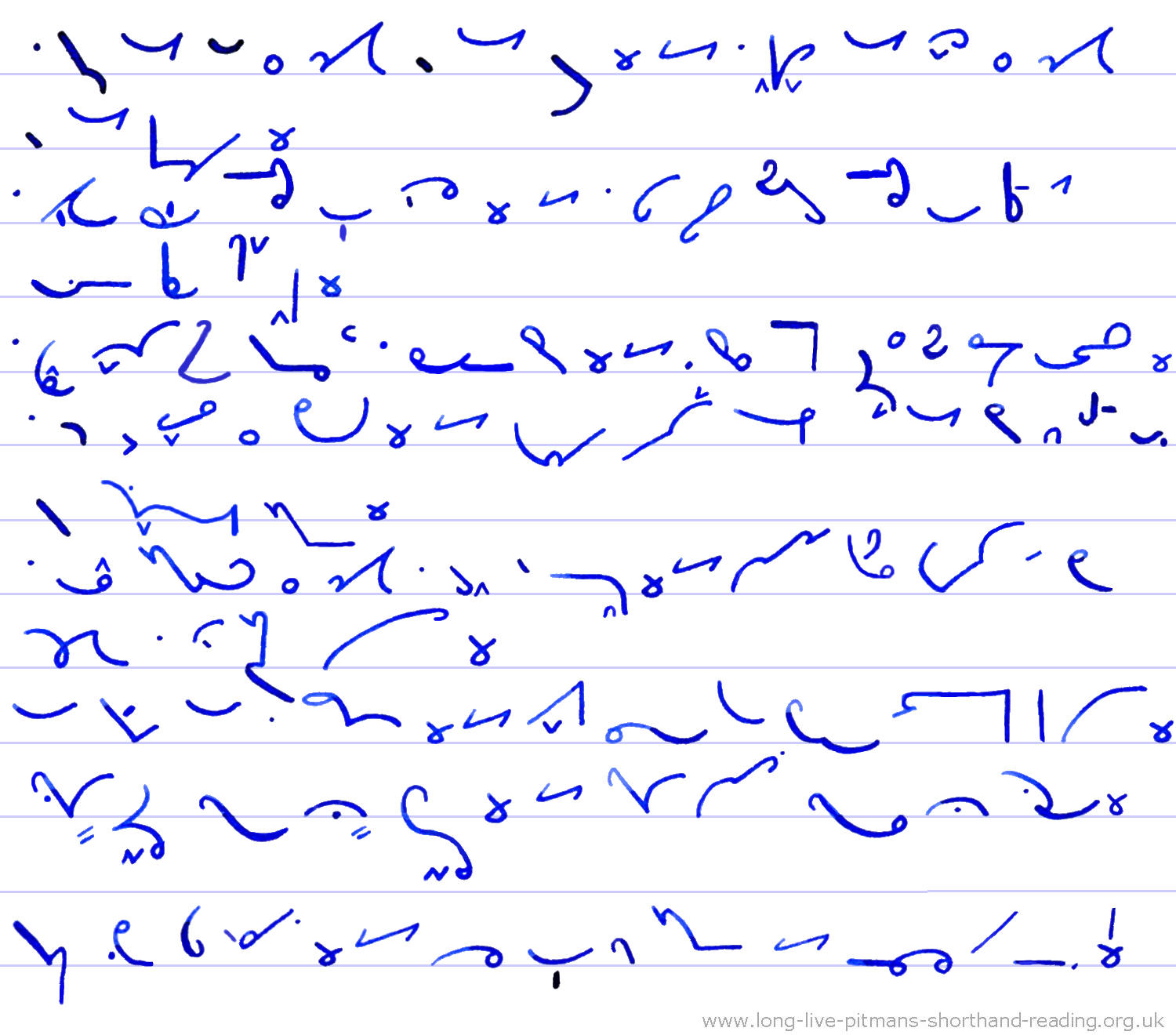
A bird in the hand is worth two in the bush. An outline in the mind is
worth two in the dictionary.
A rolling stone gathers no moss. A well-used shorthand pen gathers no
dust and the ink does not dry out.
A thousand mile journey begins with a single step. The steps get
easier as shorthand skill increases.
A word to the wise is sufficient. If you are really interested in the
subject, you don't need to be reminded to practise.
An ounce of prevention is worth a pound of cure. Learn the short forms
thoroughly and save yourself a lot of trouble later on.
Any port in a storm. Write something for everything and correct it
later.
April showers bring May flowers. April learning brings May earning.
Better safe than sorry. Miss no opportunity to practise, exams are
coming!
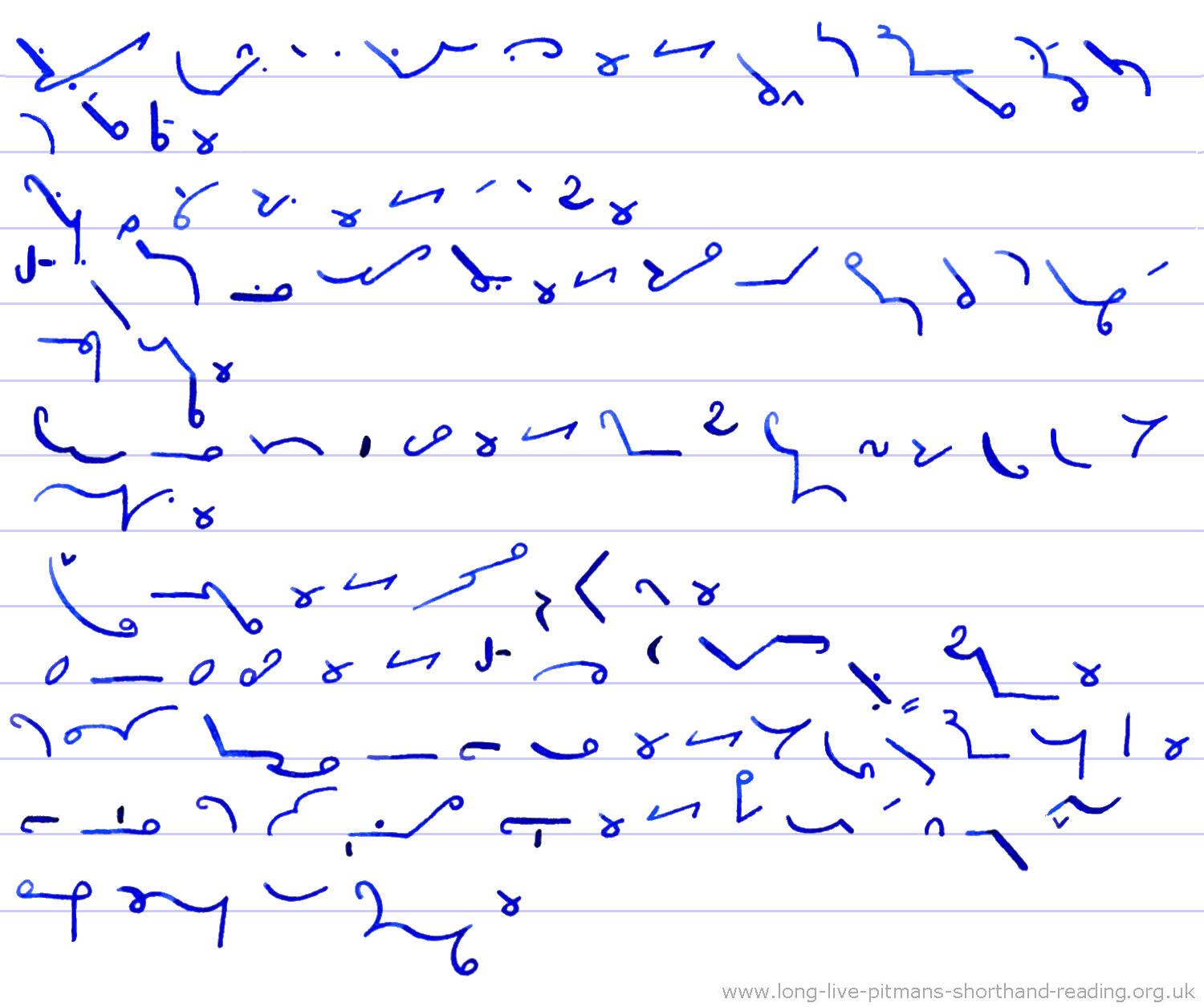
Beware the fury of a patient* man. Pounce on your workplace errors
before your boss does.
Brevity is the soul of wit. And of shorthand.
Don’t put all your eggs in one basket. Always carry spare pens or
pencils and extra notepads.
Everything comes to him who waits. Practise shorthand every time you
have to wait, even if only mentally.
Finders keepers. Refers to that job opportunity.
First come, first served. Don’t miss that bargain Ebay shorthand book.
From small beginnings come great things. Only if you put the work into
it.
Great oaks from little acorns grow. Start now and you could be writing
60 words a minute* in three months.
* "patient" See
https://www.long-live-pitmans-shorthand.org.uk/distinguishing-outlines-6-care-o-z.htm
"passionate patient"
* Omission phrase "words (a) minute"
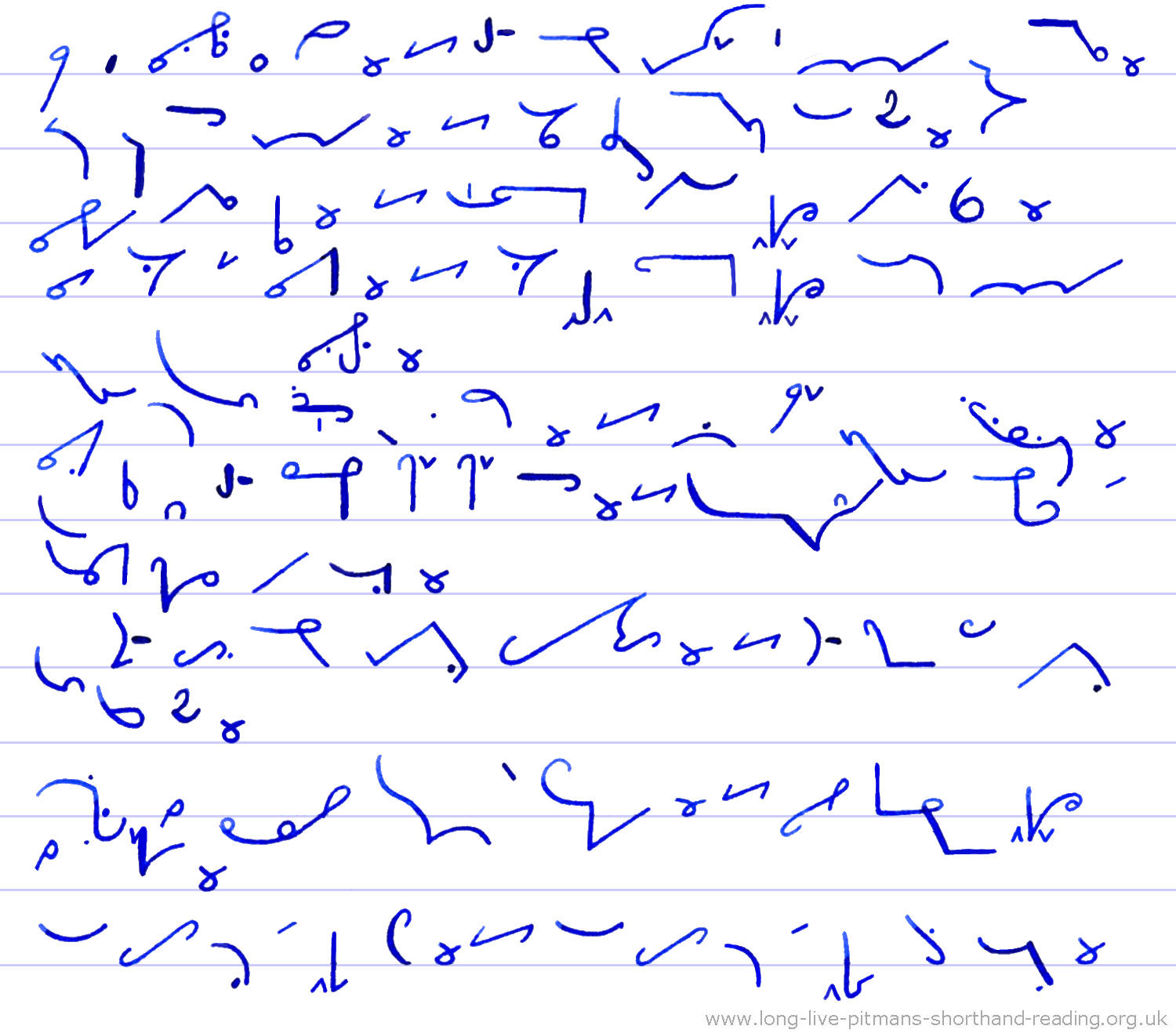
He who hesitates is lost. Don't expect to rely on memory to fill gaps.
Here today, gone tomorrow. Unless it has been captured in shorthand.
History repeats itself. Uncorrected* wrong outlines repeat themselves.
Hit the nail on the head. Nail down the correct outlines in your
memory to prevent future hesitation.
Hitch your wagon to a star. Aim high to prevent complacency.
If at first* you don't succeed, try, try again. Vocabulary extension
and facility drills are needed.
If you sow the wind expect to reap the whirlwind. Sow practice in
order to* reap fast shorthand.
Imitation is the sincerest form of flattery. Use the textbook*
outlines as the ideal.
In one ear and out the other. In one ear and out of the pen nib.
* "uncorrected" Insert the first vowel, so it is not misread as
"incorrect"
* Omission phrases "at (fir)st" "in ord(er to)"
* "textbook" Omits the second T
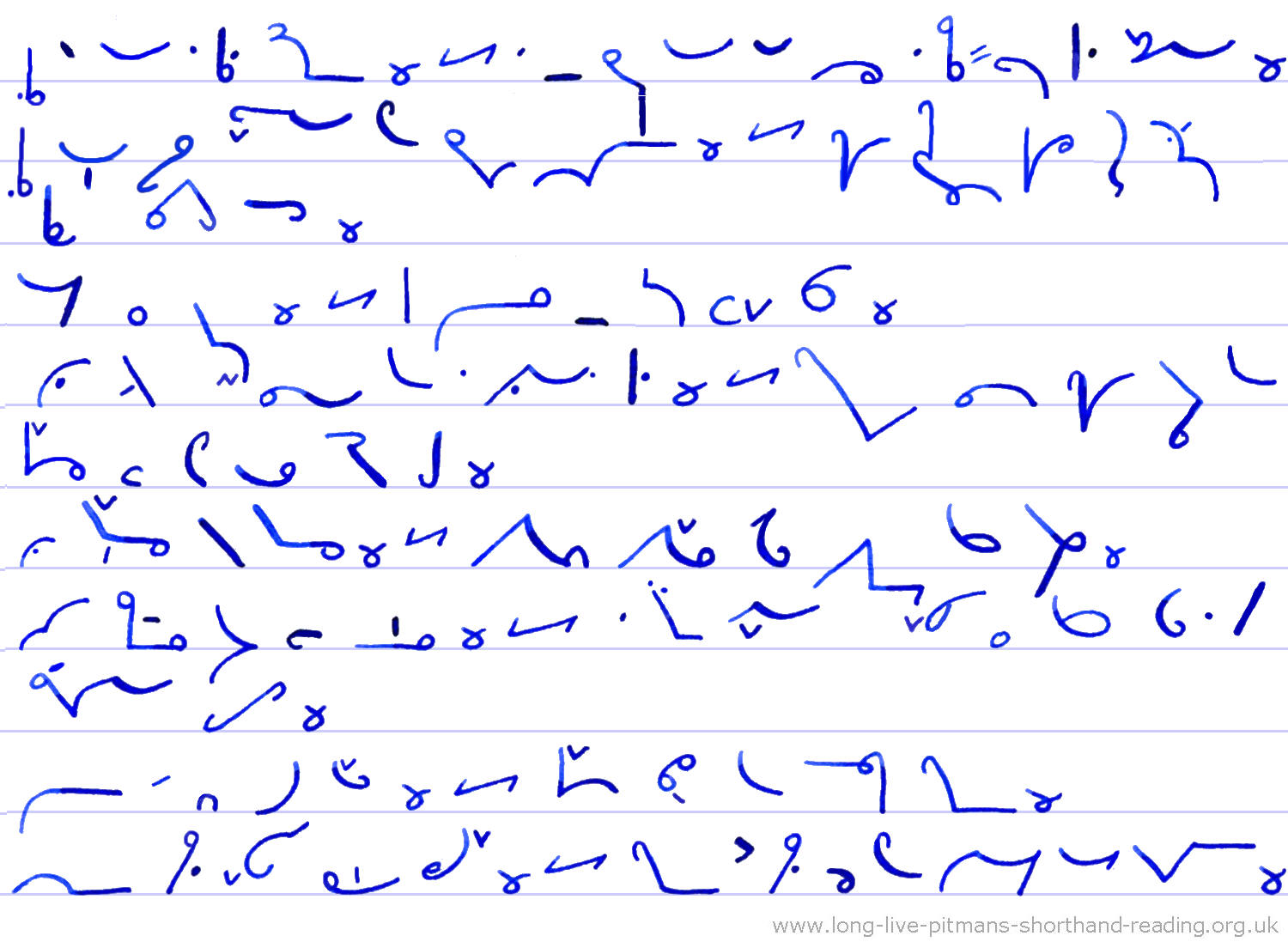
It's all in a day's work. A good speed in hand means a stress-free day
of shorthand writing*.
It’s no use crying over spilt* milk. Drill troublesome outlines so
that the error does not happen again.
Knowledge is power. It looks good on your CV as well.
Lay up something for a rainy day. Prepare some drill pages for times
when other things cannot be done.
Let bygones be bygones. Review, revise and then retake the fast
passage.
Little strokes fell great oaks. A compact writing style is faster than
a large sprawling one.
Look and you shall find. Time slots for extra practice.
Make hay while the sun shines. Practise all the Hay words over lunch
in the park.
* Omission phrase "short(hand) writing"
* "spilt" Note that "spilled" has a downward thick Ld stroke
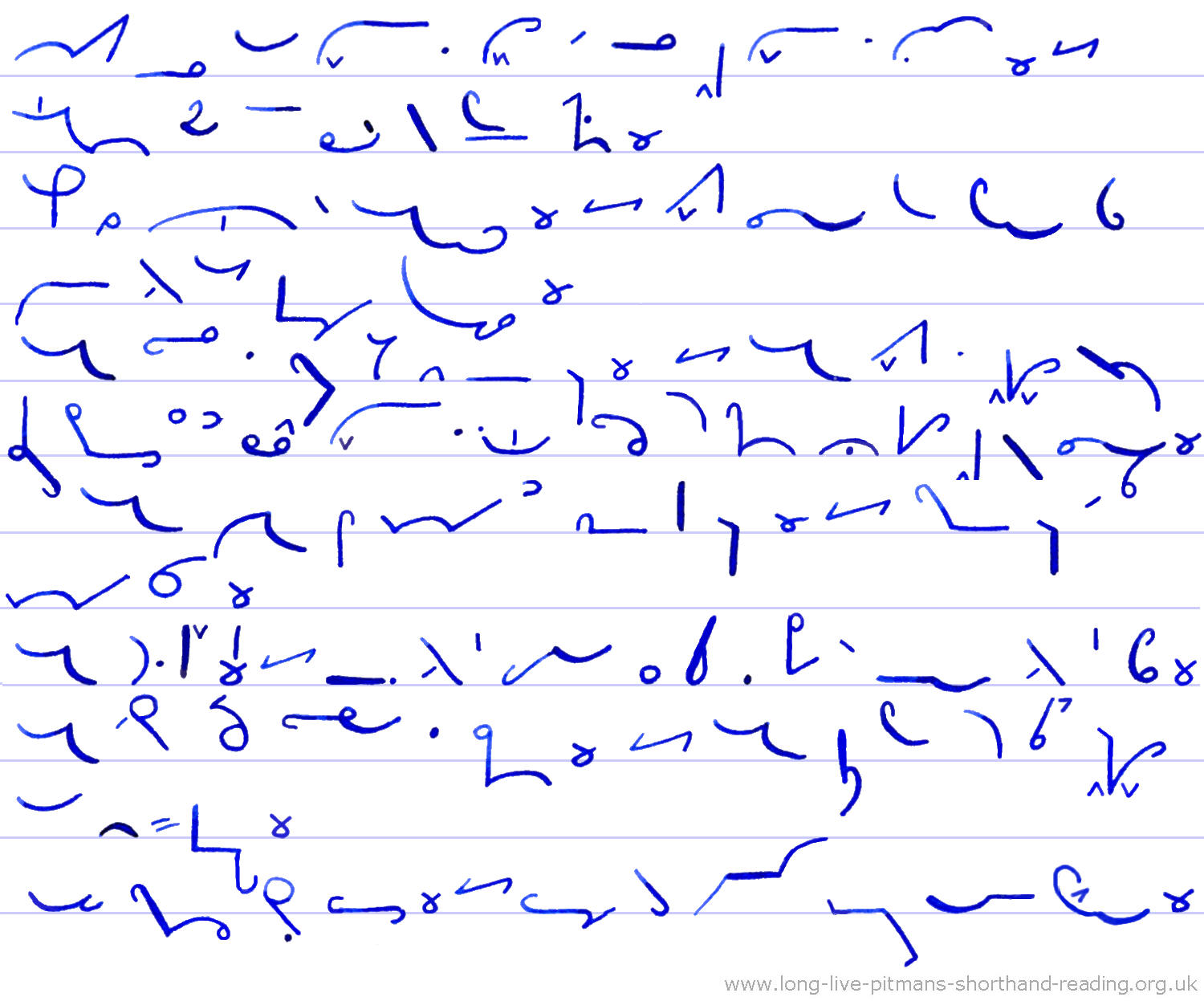
March comes in like a lion and goes out like a lamb. Unfamiliar
shorthand can soon be overcome and tamed.
Necessity is the mother of invention. Write something for everything,
then look up in the dictionary afterwards.
Never cross a bridge until you come to it. Never write an outline
before it has been spoken, as what sounds like a common phrase or term
may turn out to be something else.
Never leave till tomorrow what you can do today. Practise today and
tomorrow as well.
Never say die! Giving up on one thing* is just the start of giving up
on others.
Never swap horses crossing a stream. Never dither over your choice of
outline in mid-dictation.
New brooms sweep clean. Clean the pen regularly to keep the ink
flowing.
* Omission phrase "wu(n) thing"
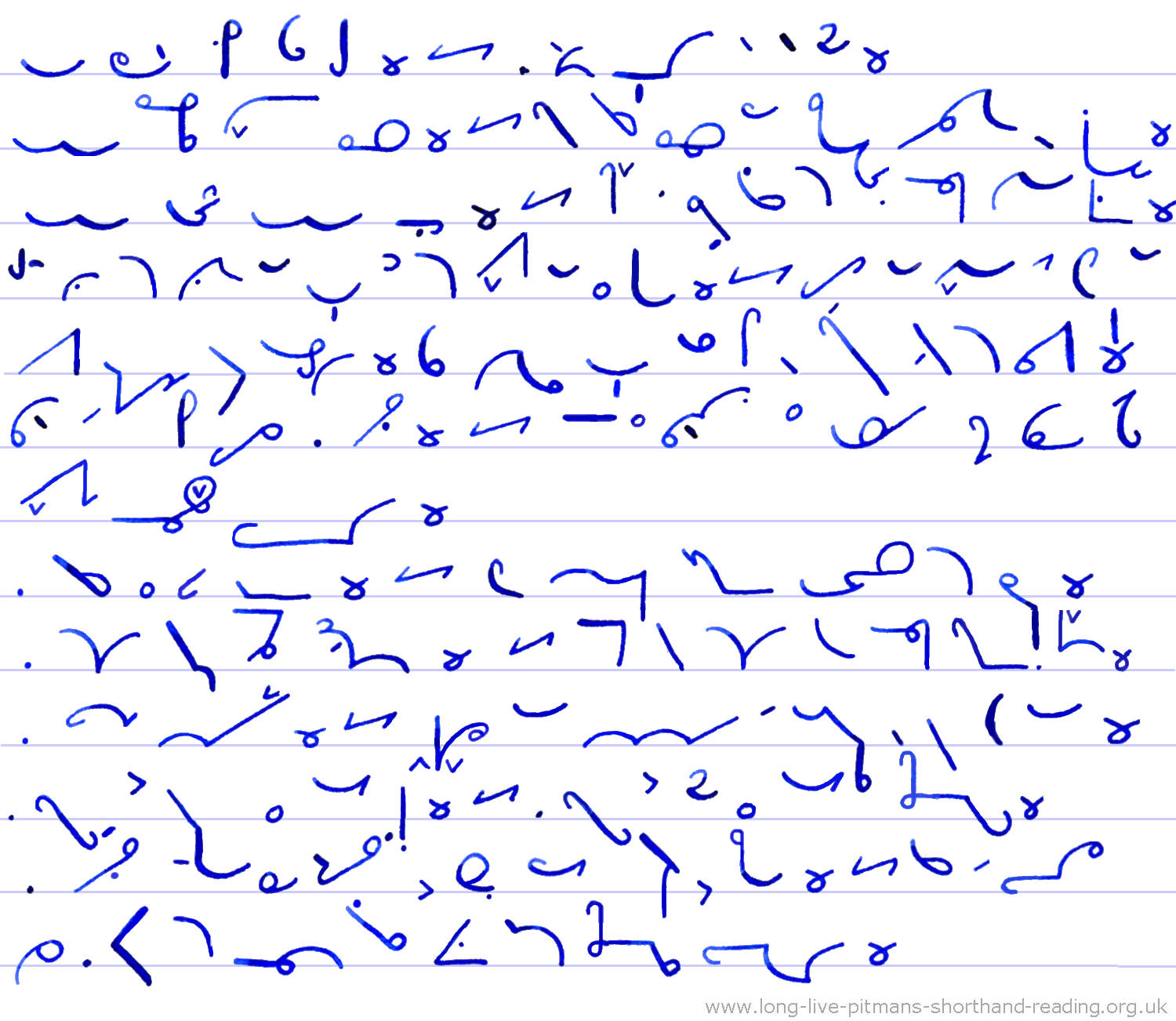
No sooner said than done. The ultimate goal of all shorthand.
Nothing succeeds like success. Remember past successes in order to*
strengthen the resolve to continue.
Nothing ventured, nothing gained. Try a super fast or an extra long
take.
Don't let your left hand know what your right hand is doing. One hand
writing and the other hand ready to turn the page instantly. This leaves
no hands at all to prop up your head!
Slow and steady wins the race. Go as slowly as necessary through* the
lesson and then write the exercises quickly.
The best is yet to come. Every minute of practice increases your
speed.
The early bird catches the worm. Get up early for extra practising
time.
The more the merrier. Outlines in memory and notepads to put them in.
The proof of the pudding is in the eating. The proof of the shorthand
is in the transcription.*
The race is not always to the swift, nor the battle to the strong.
Fast and careless loses the job or exam pass, check all your transcripts
carefully.
* Omission phrase "in ord(er to)"
*
"through" Keep the Ith well curved, as it could
look similar to
"during"
* "tra(n)sc(r)iption" Omits the N and the second R. Compare this with
"descriptions" which uses a reversed circle to suggest the R hook.
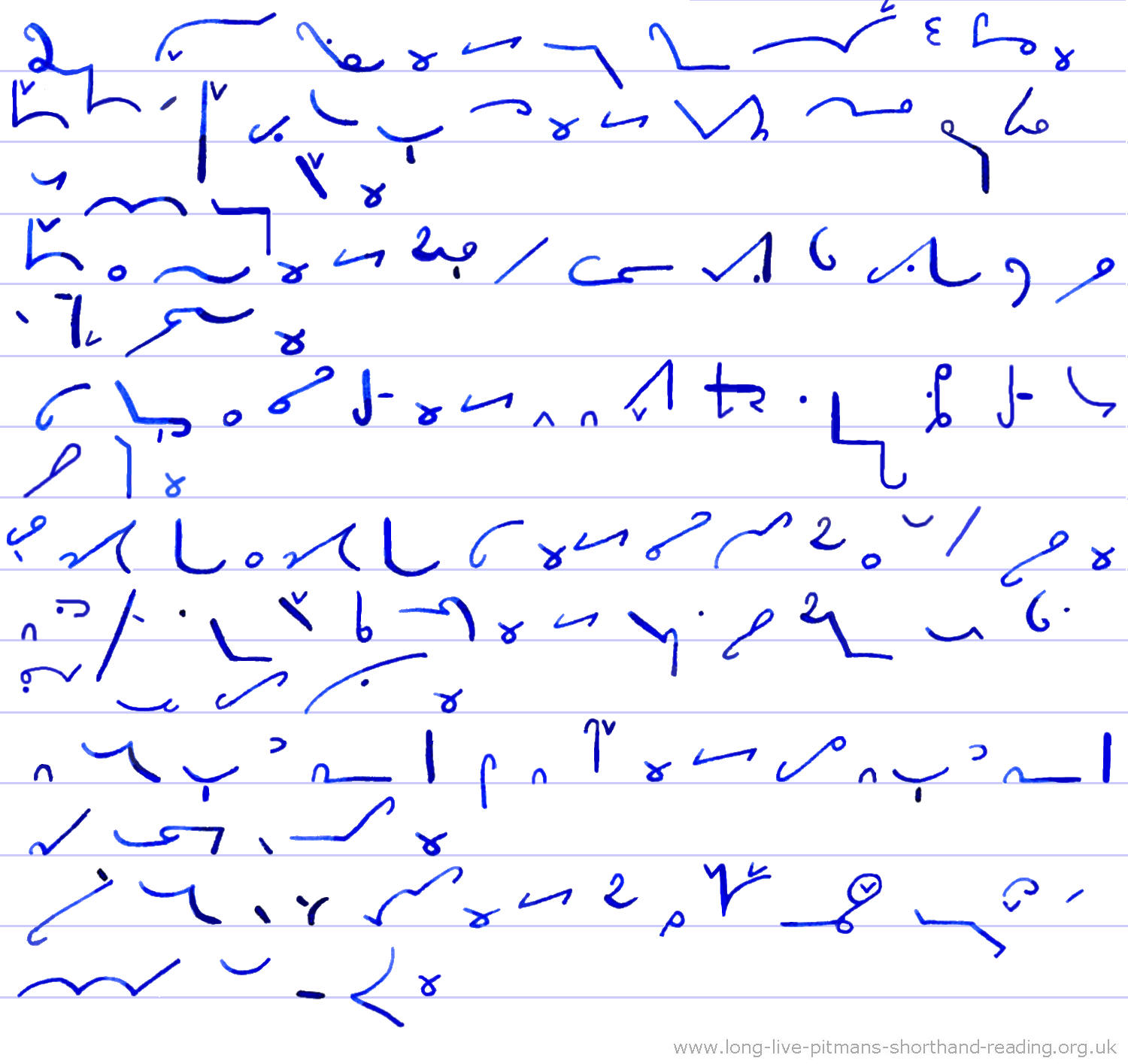
There is no time like the present. Keep practice material with you at
all times.
Time and tide wait for no man. Pursue maximum speed achievements, not
the minimum to get by.
Time is money. Shorthand notes are quicker to read than wading through
hours of audio recording.
Well begun is half done. How you write at the beginning of a dictation
sets the tone for the rest of it.
What's worth doing is worth doing well. Half learned shorthand is not
much use.
You can’t judge a book by its cover. Better a used shorthand book now
than a smart new one later.
You never know what you can do till you try. Once you know what you
can do, you are encouraged to carry on.
You're never too old to learn. Shorthand is the ideal exercise to keep
the mind and memory in good shape. (1249 words)
Top of page
|
